#its such a core aspect of her character and that being reflected in everything
Explore tagged Tumblr posts
Text
thinking about that one study on how people are less likely to help when they’re other people around bc they assume someone else will take action/responsibility and how the opposite applies to Cass, who no matter whose around will shoulder the burden of responsibility as she thinks herself the only one capable of helping/solving the problem
#its just interesting how cass cares so much and deeply about everyone#its such a core aspect of her character and that being reflected in everything#it kinda serves as a foil ig to human and their inherent relance on others#while cass only really leans on herself#and how she takes so many things in to the point that the standard she holds herself to is so high#does this make sense (??)#sorry if it doesn’t or just isnt a good interpretation#cassandra cain#dc#batgirl#black bat#blab tag
56 notes
·
View notes
Note

Okay I know this ask was completely satire and im cackling at whatever the hell this is LMAO
But it also actually inspired me to finish my genderswap au concepts of my plaguemask au TADA!!!!

I thought if they were sapphics in a genderswap au then some things would change about their designs and perhaps aspects of the story :3 Also ignore the picnic basket, they aren’t canibals I realised it looked that way too late 😭
With Dyo, I looked into what his original name meant and I found stuff like “two sides” I think, but since I didn’t make that a core part of his character im giving the genderswap au a slight name change LMAO so I called her Dya, (pronounced Dia perchance)
I also shortened her hair as opposed to just making it longer, because that just felt a bit lazy and inaccurate, plus the short hair is silly >:3 Since they met at the theatre, I wanted to give Dya shorter hair so she could fit in to the male cast, and she likely would have hid her chest with something like bandages (obviously dont do that, its like 1601 this is happening) since back then women weren’t allowed to perform, so it speaks to her more rebellious nature :3
I based Hasel’s swap off of a plague nurse as opposed to a plague doctor and changed her name to Hazel (original is said Hassle in my head) and I know this takes place before the existence of plague nurses and plague doctors however I like the theory that plague doctors were based off of 049 rather than the other way around so ill be having that methinks
so in this sense her outfit radiates purity due to the colour and the more coveted clothing sense, however the dark aspects of her character that aren’t her clothes, such as her hair, indicate a hidden side beneath her politeness and court attitude, alluding to her monster form and dark past :3
Her form in general is pretty much the same as the original, the only difference really is her face shape being pointy as opposed to curved, and her little hair tuft I added at the top of her head
When she leave’s Dya at WW1, Dya’s hair starts to look similar to hers just like the original au and vice versa, Dya also would have started wearing a cloak similar to hers and a turtleneck sweater reflecting the undergarments she used to wear :3
After a while Hazel would have started to lose the garments but im not sure to what extent, a similar cloak level to original au Hasel probably with just a cloak with the hood down, or perhaps she rolls up her sleeves and sews the dress into pants? She might look like a principal though, so maybe she loses everything but the veil and sews it into a poncho yeah HELLS YEAH I like that one better, original au callback to Dyo’s ponch too, silly
Another thing to note is that if Hasel and Dyo are the only characters gender swapped in the gender swap au, then Hazel would have been in a sapphic relationship with her wife and would have adopted their daughter (however she would likely just call her her “partner” until she finds out Dya is queer too due to social constraints at the time as it would have been illegal for them to legally marry but I like to think they ignored that hehe)
So having said that it would eliminate a part from the original au where Hasel realises he’s queer, since in the genderswap au Hazel would have known all along given she already had a wife in the past, it would change some things about how the characters act, mainly Dya, I feel she would be more open to attempt to court Hazel given that she knows she’s queer which would speed up the slow burn of my original au LMAO
74 notes
·
View notes
Text
The Tragedy of Levi and Hange
A Further Look into the Duty vs. Love Aspect of Their Relationship


Levi and Hange’s relationship was so subtle that if you weren't paying close attention, or if you’re someone who takes a scene at face value without digging deeper, you might miss it entirely.
Sometimes, people are so blind (or in denial) that even when there are romantic undertones, they dismiss them simply because the characters don’t blush, don’t openly express affection, or never say, "I love you."

I’m tired of hearing parts of the fandom invalidate or undermine Levi and Hange’s relationship—whether platonic or romantic—just because it lacks conventional displays of love. So please, let me explain why I believe Isayama designed their dynamic the way he did, especially through a military lens. (My father is a retired soldier, so I know a thing or two about this.)
When it comes to the Levi x Hange ship, we’ve often discussed how they always chose duty over personal desires. But when we say their relationship is about Duty vs. Love, what do we really mean?
One of the great tragedies of Levi and Hange’s bond is exactly that: they consistently chose duty over everything else, even their own feelings.
When analyzing ships in Attack on Titan, we often forget that these characters are, first and foremost, soldiers. Being a soldier is deeply ingrained in both Levi and Hange's identities (veterans). After serving in the military for over a decade (as of Season 4), it’s only natural that their personalities reflect military conduct and core values. It has been ingrained to them by Shadis and Erwin and their experiences.
This contrast becomes particularly evident in Season 4 of Attack on Titan, when Levi is a Captain and Hange is a Commander. As high-ranking officers of the Survey Corps, their dynamic shifts. The playful banter disappears. Levi stops calling Hange "Four Eyes." Hange becomes more serious, she even abandons her signature goggles for plain glasses.
So why all the subtlety?
In the military, there’s a term: Conflict of Interest. This arises when a service member’s personal relationships—family, friendships, romantic attachments—could compromise their professional judgment. In Season 4, Hange and Levi were exactly that: The Commander and Captain of the Survey Corps, which means, they are the highest ranking officers of the Survey Corps, the ones who provide decisions and leads the SC.
After Erwin’s death, they had no choice but to rely on each other more. They became each other’s confidants, both thrust into roles they weren’t fully prepared for. Becoming military leaders of a new Paradis.
It was no longer just about Titans; it was diplomacy, alliances, and surviving a world beyond the Walls. And amidst all this chaos, they were forced to confront not just their enemies, but their own feelings. A quiet, internal war: loyalty morphing into love, yet restrained by duty. Both felt it. Both buried it.
Before, they could hide behind their roles. But now the stakes were higher. The consequences greater. Giving in, even slightly, would risk scandal and speculation. As high-ranking officers, even a glance could be misread. Remember how Floch looked at Levi with disgust when he thought Levi chose Armin over Erwin due to personal bias? In truth, Levi denied his feelings. Had he followed his heart, he would have chosen Erwin, the easier choice emotionally. But he didn’t.
This is why, if Levi and Hange ever surrendered to their feelings, no matter how objective their decisions were, the shadow of personal bias would taint them. Their affection would be politicized. And they couldn’t risk that. Not with enemies outside the Walls. Not with their own people divided. Not when unity was fragile.
So, if you’re wondering why the romantic undertones of their relationship only surfaced when the story was nearing its end, it’s because by then, everything had already fallen apart. Their ranks meant nothing anymore. The Yeagerists labeled them as traitors. The Survey Corps was fractured. The world was literally ending.
Excuse my French, but shit had already hit the fan.
Hange killing her own comrades to protect a wounded (almost dying) Levi, the IFKK scene, Levi’s "unrequited love" line, the final salute—these moments came one after another because they could finally express themselves without the burden of conflict of interest.
But Levi and Hange’s relationship was always meant to end in tragedy.
They had suppressed their emotions for so long, they didn’t know how to express them anymore. Their gestures were always near-misses. They were running out of time.
Hange was the one who came closest to expressing affection toward Levi during the IFKK scene, but there was still unfinished business with Paradis and the Yeagerists. Then Eren declared the Rumbling, forcing them out of the forest faster than they expected. Once again, they had to bury their feelings and choose duty by forming the alliance.
A sliver of hope appeared. The alliance was formed. They had the flying boat. Levi was adamant, he was ready to address what happened back in the forest. He wanted Hange to know how he felt. Hence, the unrequited titan love line. But Hange already had a foreboding feeling. So, she pulled an Erwin. And guess what? Floch appeared and shot the gas tank of the flying boat, forcing Hange to stay behind and buy them time.
During their final conversation, just before Hange went on to fulfill her duty while the flying boat’s tank was being repaired, I believe Levi succeeded in telling her how he felt. Not in a romantic way, but in a way that a soldier like her would understand. (What do you want them to do? Kiss? In front of the kids and while Colossal Titans are literally marching toward them??? That’s so OOC for these two veterans—even I, a Levihan shipper, would cringe.)
Instead, Levi saluted her. A modified, deeply personal military salute—an unspoken confession of love and respect. And Hange understood.
And then, of course, she died after that.
Levi and Hange were always soldiers first. Isayama crafted their relationship to reflect that truth. And for me, it’s beautiful because it stayed so true to their characters. It ended in tragedy, but it was still beautiful. Like Akuma no Ko’s lyrics : The world is cruel, And yet I still love you.
Their story leaves us with an open end. Not because it’s incomplete, but because they never had the chance to complete it.
In the end, we’re left with the same uncertainty they lived with. A quiet space filled with unspoken feelings. Maybe we’re not meant to have clear answers about what they were, because they never got them either.
#attack on titan#levi ackerman#levi aot#hange aot#levihan#levi x hange#snk levi#levi x hanji#hange zoë#hange zoe#attack on titan hange#snk hange#hange#snk hanji#hanji zoë#hanji zoe#attackontitan#levi attack on titan#levihan meta#aot meta#meta analysis#levi x hange meta#shingeki no kyoujin levi#shingeki no kyojin
76 notes
·
View notes
Text
I stopped playing genshin awhile back less out of protest and more out of disappointment and frustration towards the game, so know that what I’m about to say is not an attack on genshin players because I too was there for a long time. I’m a strong believer in that all media— even the most highly regarded— will have issues and simply enjoying said media does not reflect on your values so long as you can recognize when something about it could be better. In general fandom bashing to me is a pointless endeavor that only hurts people’s feelings and is ALWAYS hypocritical because maybe you don’t like one thing that you deem bad but I can guarantee, right now, you also like something that has made mistakes.
With all that being said it makes me very frustrated when genshin fans act as if the only issue with the designs is the fact that they’re white. It misses the point. Sure, they would be better if they weren’t paper white, definitely a step in the right direction but genshin is beyond help. Natlan was just the final tipping point. At its core, genshin’s designs have fundamental issues. The colorism is the most obvious, but the lack of body diversity is also an issue. Not to mention the lack of hair texture or features, the way they homogenize culture, the stealing random cultural names or elements with no consideration for their origins, the orientalism, the age issue, and the sheer fact that their shape language/character design principles are just bad from a design standpoint. (I wrote a mini-essay on that part alone.) The list goes on.
Perfect example: I saw the new cow-girl design they released and she’s slightly wider than their other models, not even mid-size, but by genshin standards that’s fat and her defining trait is how much she eats, she’s literally a cow and one of her attacks is to accidentally sit on her opponent. Not to mention the fact that it’s supposed to be a stumble into a fall while in a tiny skirt which makes it feel suspiciously like fetish content. Fully sums up my entire point that genshin has fundamental problems with its characters.
There are plenty of people who speak out but there’s a very prevalent narrative amongst the fandom that (whether intentional or not) implies everything would be fixed if they just made them not white. And it irks me, because at this point it feels willfully obtuse. Again it’s fine to play the game, to enjoy it and interact with genshin content like you would any other fandom space but there’s a hypocrisy to the people who believe they’re speaking out by editing the skin tone and maybe adding some freckles. This is a nuanced thing. It’s about how the work is created. If you are simply an artist drawing a character with some of your headcanons that’s not an issue, it’s not even a statement really, it’s just artistic interpretation. What I’m specifically referring to is when people make edits/artwork with the intent of “fixing genshin” and the only thing that changes is skin tone.
To truly fix genshin’s designs you would have to start from scratch. And yknow what? Character designing for cultures we’re not apart of is really fucking hard and that’s why they have teams of people working on them. It’s a thin line to balance. As individuals it’s not really our responsibility to fix them but if you do walk into that territory (aka making art or edits with the intention of fixing), you do now hold some of that responsibility. I’ve seen several artists fall into this trap where they go in with pure intentions of trying to help but quickly find out how complicated it is, not only to design a good looking character, but one that respectfully includes real cultural elements (that they aren’t familiar with) and it goes poorly. Again this is why these projects have teams of people as well as diversity coordinators.
And I think the key aspect that makes designing for genshin really hard is that they will always be limited by being a fantasy setting that is almost entirely based on real world cultures. No matter the intention this type of world building makes it extremely easy to fall into offensive streotypes, because you aren’t just showcasing a real life culture, you have to take the additional step in making it into something new. We run into the issue of diluting real world cultures down to aesthetics or implying things for the purpose of narrative, among many other challenges. Inherently by making that leap into the second step we are in muddy waters. Even shows like ATLA—which are held in high regard for their integration of real world culture into their fantasy world building— still have issues (which is also a fascinating conversation but not on topic).
Suffice to say it’s really hard to do. But with the access to resources that Hoyoverse has, it’s ridiculous that these compounding issues continue to persist.
#just some reflection#almost scared to tag bc ik fans don’t like to hear criticism#just know the real enemy isn’t the fans it’s the company#genshin#txt
80 notes
·
View notes
Text
Black History Month Author Spotlight: Kiki

Our third edition of the Black History Month Author Spotlight series, features Kiki (@scapegoated-if)!
(I’m rly happy to have gotten to know Kiki better through the feature, and the interview contains really interesting insights on gender and race-locked main characters in interactive fiction, among other things! If you haven’t yet played Scapegoated (and if you’re a fan of Infamous/music IFs, definitely give it a go!)
Author: Kiki Born and raised North London, but ethnic background Jamaican (my parents are a part of the Windrush Gen)
Games: Scapegoated (slice-of-life, music, hollywood, '70s)
Short blurb: Scapegoated is about a female musician in a band that is seguing into an acting career. She is facing a lot of blame and scandal regarding the split between her band that happened in 1968. Not only are a lot of the general public hurt and angry about it, but so is an infamous serial killer that has been terrorising the west coast...
Quotes from the interview
I’m from North London. My parents moved to London when they were children from the Caribbean and are a part of the Windrush generation. I am a black, bisexual woman growing up in the UK, a place that tends to disguise its wider prejudices as a classist issue in all cases. […] A huge part of my love for music is strongly intertwined with my relationship with my late father. He passed away in June of 2023, and he was very much so kickin’ it in the ‘70s. He was a DJ throughout his life, so the legacy of LPs that he left behind was unspeakable and very ‘70s.
Read on for the full interview!

Tell me more about yourself! What are some things new readers or long-time readers might not know about you?
I graduated from a Russell Group university with an English Literature BA (Hons). I think a part of me has always wanted to be a writer in some capacity; I know that I’ve always wanted to write a book. So, I think beginning this IF has existed for me as a gateway to see what that would be like. I thought of it as a brainteaser–the prospect of exploring different outcomes and different pathways that a character may undertake. It has been challenging, dare I say more challenging than writing an actual book, but that’s exactly what I wanted out of this process.
Can you tell me a bit about what you’re working on right now and your journey into interactive fiction? What inspired the game/story you’re currently writing?
My best friend introduced me to the world of interactive fiction one day last year. She introduced Infamous to me and asserted that I would really like it because I’m a huge music nerd. Of course I fell in love with the characters and the world, but I also fell in love with the format of IFs.
A huge part of my love for music is strongly intertwined with my relationship with my late father. He passed away in June of 2023, and he was very much so kickin’ it in the ‘70s. He was a DJ throughout his life, so the legacy of LPs that he left behind was unspeakable and very ‘70s. I am a huge music lover with such a wide-spanning eclectic taste, but the period of music post-”Dylan going electric”, post-”Elvis being on the out”, Quincy Jones (rest in king) and Beatlemania is just everything to me, so the idea for Scapegoated came into my life in a very natural way. I knew that whichever story I told, I wanted it to explore the Sunset Strip, groupies, rock ‘n roll, The Beatles, The Manson Family and Cher all at its core.
I am of the opinion that coverage of the ‘70s music scene has been run into the ground lately. There has been a resurgence of nostalgia within the public consciousness when reflecting upon this time due to Daisy Jones & The Six, which was one of my favourite shows the year it was released. So, including Hollywood and murder was my attempt at innovation.

How has your identity, heritage/background, upbringing, or personal experiences influenced your storytelling or writing process? OR How does your work feature aspects of your identity / experience?
I’m from North London. My parents moved to London when they were children from the Caribbean and are a part of the Windrush generation. I am a black, bisexual woman growing up in the UK, a place that tends to disguise its wider prejudices as a classist issue in all cases. I am writing Scapegoated as someone that has only been to the US twice for two weeks at a time. I am writing Scapegoated as someone that can only relate to two aspects of my main character. I am writing Scapegoated as someone that has experienced discrimination and has been scarred by instances of discrimination. In university, I tended to be quite outspoken; in my first year, I felt quite ostracised by my predominantly white cohort during the BLM movement, because I seemed to be the only one willing to speak out in favour of it.
When I first wrote Scapegoated, I was inboxed on Tumblr and replied to on the Choice of Games Forum with genuine curiosity about my choice to gender and race lock my protagonist. This is an excerpt of my response:
I didn’t want to have a self-insert MC because I wanted to ensure that the conversations had revolving these social issues and the murders that unfold aren’t danced around. Perspective is an extremely important factor in that, and I want to ensure that the MC is directly involved–rather than just there as things happen because it wouldn’t be interactive. [...] Initially when I planned this story, before it was titled and the only thing I knew was that I wanted to write an IF about the '70s music scene, it was neither gender or race locked [...]. But I did toy with my ideas by self-inserting (I’m a black woman) when I was attempting to figure out the logistics of gameplay. That’s when I realised that due to the time period and all of the change that was happening at the time, social issues had to be discussed.
To this day, I am extremely proud of my decision and the conviction in my decision. I asserted a level of loyalty to the story I am telling in a way that I didn’t know I was capable of; retrospectively, I think I took a kind of power in it. But I really love the story I am telling and the range of representation.
I am trying to work the line of prioritising my vision, all the while giving weight and importance to my readers’ opinions in the way that these very interesting and thorough opinions deserve. It warms my heart that even one person might care about my characters just as much as I do.
what are some of the most rewarding or challenging aspects of writing Interactive Fiction for you?
Songwriting. I’m tragic at it, but I like to think I’m self-aware enough. There are different characters with different voices and different reasonings behind their songwriting styles. I struggle to ensure that their songwriting oozes with their individual personalities.
What does your writing process look like? Any rituals or habits? Any tips, tricks, philosophies or approaches that have worked very well for you?
Story beats. However, planning and writing can exist as two entirely different realms to me. What I think the story may be, can develop into something entirely new all on its own once I begin to write. Sometimes characters that I think I know transform into someone entirely new once I start to get to know them through writing their dialogue. I’ve experienced this with several characters already. On the contrary, some characters are so secure in my mind that they can’t be anything other than who I’ve introduced them to myself as.
I really love the writing process I’ve conjured up. It hasn’t failed me yet, but it isn’t secure–writing can never be anything other than an insecure process. Writing, for me, always remains in a constant stage of planning.

Do you have favourite interactive fiction games, characters, scenes or authors that you’d like to recommend?
I have received a lot of IF recommendations due to how new I am to IFs. I truly haven’t read very many, so all I can recommend to anybody are the 3 IFs that I have read which I each loved enormously: Infamous; College Tennis: Origin Story; and Apartment 502.
If you were to say one thing to your readers, other authors, and/or the interactive fiction community: what would it be?
I only got here in December, and so far everyone has been extremely welcoming and helpful. Honestly, I have no notes. All I can do is encourage everyone to give writing a chance. It’s been so fruitful and rewarding for me, so I strongly urge everyone to give it a shot if you’re considering it. Stop thinking, just do!
Any books, music, movies etc. you’re obsessed with at the moment, or which changed your life (or perspectives on something)?
I’m currently reading I’m With The Band by Pamela Des Barres as research for my IF, which has been a great insight into the mindset of groupies on an intimate level.
As for something that changed my life, I recently watched Sing Sing (2024)--which wasn’t something I did in relation to Scapegoated, I am just an avid film-watcher–and it was such an incredible de-stigmatising eye into the prison system. An extremely important watch for Black History Month, too!
This-or-that segment: (bold = Kiki's pick)
Coffee or tea?
Early mornings or late nights?
City or countryside?
Angsty or Cozy romances? (Or enemies-to-lovers or best-friends-to-lovers?)
Steady progress or frenzied binge-writing followed by periods of calm?
Summer or Winter?
First drafts or editing?
Introvert or extrovert?
Plotter or pantser?
Characters or plot first?
Kiki’s custom “either-or” pairing: writing in silence or with music playing?
#interactive fiction#cscript game#interactive games#author features#black history month#interview feature#spotlight#poc game developers
104 notes
·
View notes
Text
Catwoman Vols 1 & 2 so far:
I’ve just finished Moench’s run and am eagerly anticipating moving onto Devin Grayson’s, so I thought I’d do a round up of the various writers on the title so far, because it is very, very 90s in places, and I’ve been trying to sort out the differences in approach for myself.
Let’s talk about the writers!
Mindy Newell (Catwoman 1989): I think the most valuable work Newell does with this series is how it takes Batman Year One and refocuses and explains the story in terms of its effect on Selina as a character. It gives her (and Holly and Maggie) agency in the narrative that was not present in Miller’s work. (They should package this as a back-up with Batman Year One, just as Oracle Year One should rightfully be at the back of any reprint of The Killing Joke, if DC had more respect for its female characters). I also really like Newell’s focus on the impact of the grittier aspects of the story on Selina in particular: you really can see her background in nursing in the writing.
Mary Jo Duffy (Catwoman #1-14 1993): What I particularly liked about this run is the fun Duffy had in slotting Selina in around everything else going on in the narrative. Her run is set across Knightfall overall, and informed by it, but rarely fully crosses into it. I love little bits like Selina sneaking onto Bruce’s flight to Santa Prisca at the start of Knightquest, the flashbacks of her history we get here (training as a circus acrobat!), and the repetition of Selina’s ongoing focus on danger and poverty among children and young women on the margins of society. It’s a very episodic run – characters are often dropped straight into the story in a way that you presume that they had been previously established somewhere else (like her butler, Wilder, who just appears in issue #8, or the animal rights protesters in the Knightquest crossover), but no, they’re brand new.
Peter Milligan (Batman: Catwoman Defiant 1992): Milligan really only has this one-shot. It’s interesting in that it’s a proper team up with Bruce, which is otherwise quite unusual around this period in Catwoman titles – she’s more likely to reluctantly end up working with Tim or Jean-Paul than Bruce himself. It’s a lot of stuff about the faces you show the world and secrets concealed, which goes into the core of Bruce and Selina’s relationship.
Deborah Pomerantz (Catwoman #22-24 1993): This is a classic ‘steal from the mafia in Gotham’ Catwoman storyline. Selina tries to steal something from the family and then gets overinvolved in the many many plots everyone in the crime family are running on each other. I don’t think this is the best execution of this basic plot I’ve seen in a Catwoman run, but it’s a familiar one.
Alan Grant (Batman: Shadows of the Bat #43-44, Catwoman #26): Grant gets a crossover with Catwoman here with both Ratcatcher and Catman running around the narrative being terrible. I wouldn’t say it’s his best work; the approach to Thomas Blake in particular reinforces the culturally appropriative nature of his backstory regarding his source of powers, and his position as a joke character before Gail Simone rescued him from the set of D-listers that nobody cared about for Villains United and gave him a full personality and backstory makeover. It’s…fine. It does give Selina and Thomas just cause to have beef with each other outside of their overlapping themes.
Chuck Dixon (Catwoman #15-21, #25, #27-37 1993): Dixon’s run is one of those world-hopping thief of adventure, Selina Kyle! style runs. She’s very rarely based in Gotham itself during his run, and is generally getting commissioned to go off to international locales to steal things and end up in situations. It has, on reflection, got more than a little of the flavour that Dixon ends up using for his Birds of Prey run. It’s very Dixon in places, particularly in how many male characters are attracted to Selina (there’s even a potential forced marriage to an evil European aristocrat that Selina manages to duck out of, which…yeah, shades of Dinah/Ra’s anyone?) and also in his very free hand with the concepts of ethics around archaeology and artifacts. We go raid an ex-Nazi compound, at one point. We also have a very Indiana Jones style adventure into a combo of ancient Order of St Dumas and League of Assassins secret plots.
Doug Moench (Showcase ’93 #1-4, Catwoman #0, #25, #38-53 1993): I think what I get a lot of out of Moench’s run is titillation for various characters with a whole heap of Sexy Villainesses (and not only because we’ve got Balent on art), and a heavy focus on Selina’s Terrible Birth Family and Childhood In Orphanages and Reform School leading to her learning to steal. There’s a whole plot thread running through his run from #0 up to the end about one of Selina’s rivals, Cassandra Cartland, who also was a thief in the orphanage and wasn’t as good as Selina. He does Catwoman Year Two, which is honestly mid: it’s a lot of Selina thinking she’s oh so clever (while not being) and using other Rogues as cover to distract Bruce while she commits thefts. There is definitely a focus on Selina’s joy in stealing things and enjoyment of both the challenge but also possessing shiny things. Moench also does do a chunk of work with Selina’s pivot towards caring for the underclasses in his Showcase ’93 story, Struggle Street, in terms of establishing that as part of her post-Crisis characterisation.
21 notes
·
View notes
Text
Was feeling silly over Sinatra and I wanted to break out one of my Dean and Jack metas by itself. It's from this monstrosity, but I love it so. I'm pulling it out to ponder over today.
//
Dean’s answer to the Harper-coded ideal of perfection:
So, last we left off, Harper was writing dreamily about how she’s gonna find Jack and everything’s gonna be PERFECT.
Which is why it’s so beautiful to me that Dean, who has struggled with some of the same abandonment trauma and overall clinging to his first familial loves out of desperation, is the one to narratively provide a rebuttal to that!
Harper sighs dreamily and picks up her coffee mug of domesticity:

And the scene cuts to Jack, as if he’s right there across from her. (He’s sitting in her empty spaces, hundreds of miles away.)

And Jack is so satisfied. The coffee didn’t taste good to him at the very beginning of the episode. He “couldn’t get it how he liked it.”
Now, it’s very satisfying.
///
Harper and Jack are both satisfied is different ways. Harper, because she left her past behind, and Jack because he’s proved himself as a capable hunter worthy of being brought into the family business. It’s all part of growing up.
They are still thinking about each other and what they learned in meeting each other. Jack is specifically asking Dean about love:
JACK: And that’s, love? DEAN: Eh, actually love can get crazier than that. And it might get crazier with Harper still out there. But, uh, you did good, kid.

In Jack’s family kitchen, we find Dean sitting in the narrative “Harper position,” fielding Jack’s questions about love and providing important guidance.

But Harper’s “mentor” space is sadly empty. She has no one to guide her. Only a stack of books. She gets her ideas about love…from books.
///
As for Jack, Jack leans a little too far into being Righteous here. He says to Dean: “I was right! I should be going on more hunts!”
This reminds us a little bit of Claire Novak, in 11x12 Don’t You Forget About Me:


"I was right!"
///
But Dean?
Dean gently redirects the conversation. Dean doesn’t talk about perfection. It’s not about being right. Or righteous, for that matter.
DEAN: Okay, alright. It’s not about being right. Kay? You’re gonna make mistakes, hell, I make them all the time. But it’s how you handle yourself once you’ve made those mistakes and you’ve learned from them.
Dean’s entire season 8 arc was about accepting the imperfect family: “love, and love.” This is echoed again, just a few episodes later, with AU Michael taunting Dean specifically about Cas’s mistakes:
AU MICHAEL: …he “gripped you tight and raised you from Perdition.” Or whatever. But since then, what has he done? Only made mistakes, one after the other.
AU Michael doesn’t grasp the complexity of love and all its imperfections. Real, lasting love allows for mistakes and growth.
Anyway.
Mistakes! (And accepting them! It's an amazing theme!)
And that lands for Jack. He considers the words, assessing, and like how he was with Harper, he gets a Very Good Emotional Read on Dean.

(Unlike Sam, a “brain” character, Jack’s very much a heart character. He’s GOOD at this aspect of humanity. He connects almost effortlessly, even when he’s awkward.)
And especially because he and Dean (and Mary) are built similarly in their emotional cores and neuroses, he figures out exactly what Dean needs to hear, echoing their earlier convo about Michael—
(HERE'S THE CONVO B/T JACK & DEAN, EARLIER IN THE EP:)
JACK: Dean, what happened with Michael, no one blames you. DEAN: Cool, well I blame me, so… /////// JACK: Dean, I need to do something. You don’t understand. I could have killed Michael. Here, when I was strong enough, I could have. But there was so much going on and then everything else happened because I was distracted and stupid and DEAN (angrily): Hey! You didn’t do anything wrong. JACK: And neither did you! But that doesn’t make it any easier does it?
Jack takes this earlier conversation and echoes it—and reflecting a cheeky, wry sense of comfort…right back at Dean himself.

DEAN: ...it’s how you handle yourself once you’ve made those mistakes and you’ve learned from them. JACK (comically throwing Dean’s own advice back at him): —and how to not beat yourself up over [those mistakes].
Aw.
It hits its mark. ❤️

We get his, “Stop seeing right through me, Kid,” look:
DEAN: You know Jack, you’re pretty smart sometimes.




Dean tries to hide his smile in his drink.
And Jack knows his words hit, that he’s cheered Dean up. He’s so pleased about it, too! He got ‘im.

They’re, very unfortunately for both of them, very much on the same wavelength with this sort of thing, with their neuroses and emotions, and they know it.
///
(Who's giving who advice here? hehehe. Maybe it's a little give and take. They comfort one another because their hearts are made of the same stuff.)
#spn optimism#harper sayles#jack stuff#jack kline#spn season 14#spn 14x06#spn steve yockey#jack relationships#in some ways i am ALWAYS optimism posting#mara adjacent#chuck adjacent#on mistakes and baggage#we love a dean theme
40 notes
·
View notes
Text
Higurashi: Atonement Chapter 1
We open with a poem from Frederica Berkastel. She speaks of a repeating tragedy. As it repeats she goes from shock to agony to thinking its a vicious joke by the seventh time it's happened.
It is more than likely a coincidence since Beyond Midnight is a manga-only arc and not part of the core series, but this is the 7th arc. By now, we're probably becoming a bit numb to all the events that have happened and are just wondering how everything goes bad this time.
We have the return of Karin Suzuragi, who drew the art for Abducted by Demons, as well as the core cast. We haven't seen them together like this since Curse Killing. Shion's also there.
It really has been a long time since I've seen the cast just having fun, playing around, forcing each other into embarrassing cosplay, and Rena going nuts from a cuteness overload.
Ouch. Shion is not in that one group image.
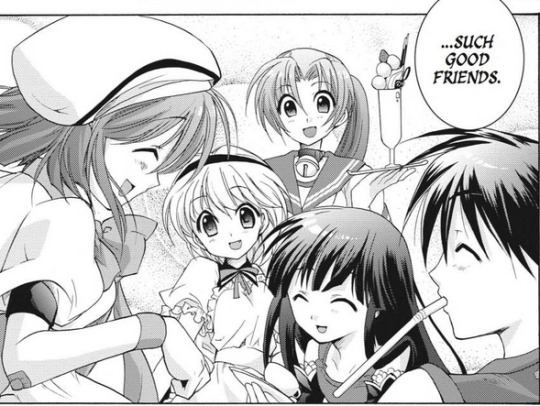
This is the second answer arc and it's pretty clearly billed as the answer arc to Abducted by Demons. Just like that arc, Keiichi is our protagonist with Rena being the main girl...
Until the perspective flips half way through and Rena is the perspective character instead.
This is an answer arc. Keiichi asked himself why Rena seems sad and we get to know why.
We got to find out a little about Rena's past back in Abducted by Demons, but we can hardly say we know anything about her at this point. Now we get to see her home life with her divorced dad and his girlfriend Rina Mamiya.
Does that name sound familiar? That's the name of the woman who was killed in the beginning of Curse Killing. In chapter 7, Detective Delicious Ooishi gave a full dossier on her, including that she's involved in extortion and works for Teppei Hojo.
So we can look forward to trouble coming up in the future.
It's Kenta-kun!!
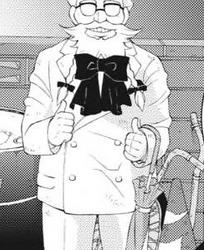
And this chapter ends with us finding out what this arc is going to be about.
Rena's behavior when it comes to Oyashiro-sama's curse has been an ongoing aspect of the story since the beginning. She's never been willing to talk about it and every moment she lets herself slip shows she's utterly traumatized by it.
But we just got a little glimpse of it at the end of this chapter when she saw maggots crawling in her blood. And this isn't the first time this has happened to her.
Last arc, we got the answer to Mion's involvement in the series of murders. This arc, we'll find out the secrets behind Oyashiro-sama's curse.
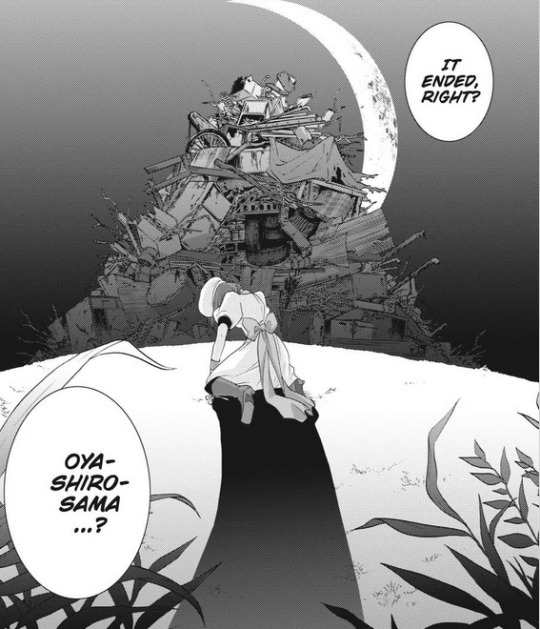
By the way, The new moon in 1983 was June 11 and the first quarter moon was June 17. So the waxing crescent means this arc is starting somewhere in that date range.
NIPA BEAM!!
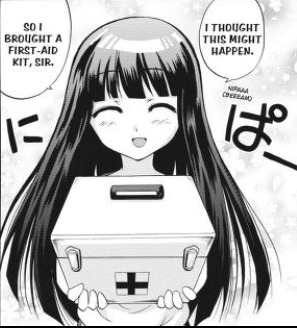
back
Spoiler Discussion
Frederica's opening poem reflects a bit of the reader's feelings, but the juxtapose with Rika is a light foreshadowing of the big reveal in this arc. The poem is just as much about Rika's feelings on things. She died and came back then was killed over and over. At this point, she's used to it and has kind of given up on expecting to stop tragedy from happening.
2 notes
·
View notes
Text
persona 4 spoilies but i kind of really like the presentation of izanami as the “secret mastermind” or whatever, like i think it *feels* good, i don’t think it detracts from the mystery as presented either because. well yknow you solved the core mystery so this postgame event is more akin to a reflection on why things happened than anything. not to mention the vibes of “Yomotsu Hirasaka” are soooo good, that somber piano melody with accompanying strings…
the izanami segment + the preceding hollow forest with marie are very fun extensions on that feeling the game is trying to create, of actual whole truth being elusive, people being easily lost, or feeling like they already have a grasp on it when they don’t. you banish the fog, except you didn’t really- so marie/kasumi takes it within herself to die with, but that isn’t right either- so you then seek out the true dominant aspect, the vengeful goddess of yomi, who challenges the idea that truth is desirable. the changes in the rerelease make this about marie/izanami’s identity, is she the protector of people, the judge of people, or the adversary of people? who is the real her? this kind of convolution of identity and self-concept is present in so many different characters, it’s a pattern familiar from the main mystery and nearly all social link storylines. i think a problem people have with p4 is storylines that feel setup for one thing, but then resolve in another way- the initial expected catharsis is subverted for the sake of questioning the base assumptions held. this ends up looking like:
status quo is dissatisfying -> status quo is threatened -> actually everything was fine and no action needs to be taken
but there is genuine internal transformation which then does lead to genuine change in status quo. like, yukiko’s arc for example, it gets criticized for ending where it began- yukiko feels like she’s on a set path to inherit the family inn, she dislikes that and wants to strike out on her own, but then she realizes that she does love the inn and wishes to stand by it. this is further represented with her persona beginning as konohana sakuya upon accepting her misgivings, and then transforming into amaterasu upon finding true resolve. konohana sakuya is this figure who is deeply connected to the town the game bases its setting off of, the shrine in inaba is based on one to konohana sakuya, and her story is one of proving herself in dramatic, destructive fashion after disgrace. amaterasu by contrast has a deep connection to legacy, being the alleged origin point of the royal line or something, and features in a story where she is called to return to those who need her, to not deprive them of her sunlight. yukiko goes from burning herself to recognizing brightness within. it’s not acceptance of where she was, but strength gained through persistent analysis both of herself and the world around her.
izanami as a mythological figure is kinda in the lineage of Women Who Are Responsible for All Death, and is simultaneously a mother goddess and death goddess. the primary story with her centres around her being the first to experience death, to then be failed by her brother-husband who looks upon her before trying to take her out of the underworld, thus spoiling that effort. in persona 4, the truth that embitters her has to be that of her abandonment, and her death… both tragic elements that are kinda existential. so (in-game, not in myth) her role of ascertaining man’s desire and then manifesting it- through obscuring fog that makes truth unknowable- is an expression of care and of cruelty… but like, the game allows for the tragedy of izanami to be subverted? like obviously the player survives the 1000 curses through the power of friendship, but she literally gets another chance at life and at the protection of others, through marie. a literal “new incarnation of the goddess”… get it. because. “shin megami tensei”… okay sorry. but idk i think it’s like this oddly optimistic ending, the pursuit of truth not just being the acceptance of death but also creating the possibility for life… it’s such a fun cap to the experience!!! i loved persona 4 a lot i’m now realizing. this has been stream of consciousness i’m on a long bus ride rn. sorry about the text wall if this ended up being long. not sure if i actually made clear the connections in my head and i am not looking over this to check or edit. love ya ❤️
1 note
·
View note
Text
With all due respect, I wasn’t very impressed by this post. I know that this was meant to be just your scattershot thoughts on NEO as a whole and I understand that but even then, I thought the whole post was surface-level as all hell. I think my whole problems with this post is how it seems to mistake novelty and shock value as being inherently more valuable than deeper dives into established concepts. I’m not against the former at all. In fact, the fact that OG TWEWY was as cohesive as it was while also being entirely its own thing still stands out as impressive to me even after all of these years. However, I also think that’s what leads to a lot of fans putting the game on a pedestal and pushing it up while also tearing down NEO in the process and frankly, I don’t very much care for that sort of thing.
For me, I think the most impressive thing about NEO is that it inverts (get it? Like Inversion?) a lot of things within the original but not with the intent to foil it just because. There are certainly a lot of deliberate callbacks to the original in NEO (An0ther basically being Rindo’s CAT, Shoka sharing traits with both Neku and Joshua and even having Sakura in her last name, having the three weeks again, a full-on team structure as opposed to just duos, the ideals of Shinjuku vs Shibuya, etc), but the game puts forth its own unique twists on these concepts to have them fit within NEO’s themes and make them feel natural. Fret shares a very similar backstory to Neku when it comes to having dead best friends that shaped their personalities but Fret chose to cope with his grief in a different way and as a result, he has his own problems to deal with in contrast to Neku. NEO uses the skeleton of the original but aims to tell a story to add on to its lessons of human communication and reflect on the struggles of teens and adults alike in the modern era, and as a sequel to something like TWEWY, I think that’s the best possible call they could’ve gone with.
The other thing about NEO is how it’s a deliberately much more subtle game than the original and how it relies a lot more on you looking between the lines in order to get the characterization. Kanon is a pretty good example since she at first seems like a femme-fetale character who turns to the side of the heroes but when you dig deeper into her character, you get to see how the never-ending game really affected her.
>get stuck in a rigged, never-ending death game
>come to form an unspoken alliance where the top 3 teams (sans Ruinbringers of course) keep their footing by sending new players and other teams to last place
>a couple of insanely OP kids come around and screw that whole plan up just by existing
>while the kids do almost bring about change by beating the Ruinbringers, it ultimately doesn’t even matter in the long-run due to how incredibly rigged the the Game is and as a result, the DRS are eliminated, getting rid of Kanon’s and Motoi’s safety net
A part of her legitimately did start to resent the Twisters for all of that but she still kept it to herself because she got to know them better and see them as kids who had no idea about everything she and the others went through so she keeps the resentment to herself because it’s not fair to them.

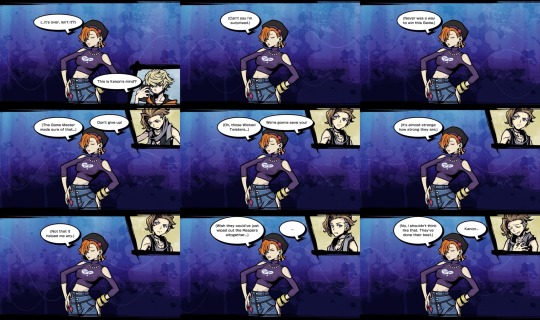
NEO is at its core a time travel story and like any good one, it uses this aspect to inform a large majority of its themes and character/plot writing, which is thematically appropriate in a way when you think about it: a game all about using time travel to notice the little details in a way that can have you get out of a sticky situation also rewards you with a deeper understanding of the characters when you go back to it or notice all of said aforementioned details beforehand. As such, the new cast tend to write off other people as shallow and not worth the effort at first (Nagi with Fret, Rindo with quite a wide variety of people, the Wicked Twisters with the other Player teams in general), but they become better about this as the game goes on.
I also couldn’t disagree more on Rindo. If anything, I actually found his character arc to be a lot more fluid/interesting for me compared to Neku (who I still love as a protag, don’t get me wrong). The thing about Rindo is that while people tend to boil down his arc to just being about his indecisiveness, it's a bit more nuanced than that. What makes Rindo's kind of indecisiveness problematic was his complacency and comfortableness with letting other people make decisions he'd rather not commit to. The moment someone comes around who seems capable, he's quick to obscuring himself into the background and riding on the coattails of other people's capabilities. I personally didn't need Rindo to have some dramatic internal conflict like self-deprecation, vanity, or depression. What matters when it comes to writing a character's flaw is how well the writing illustrates that flaw and I found that NEO painted Rindo's anxieties vividly whenever he was fraught with challenges. Most of the game, we see Rindo in his head, neurotically commentating on every move he or someone else does. It's shit like that that builds character; seeing Rindo feel things makes you care about him, even if his indecisiveness may grate at you sometimes, you understand why he is that way based on what's established about his character.
He’s indecisive, overthinking, in his head a lot, and untrusting as hell apart from a few select people, can be a passive-aggressive asshole as shown with how annoyed he gets with Fret and the others at times while never really voicing these gripes and just going with the flow in the hopes that things will work out without his input, waffles back and forth on his decisions even after he’s already made them (such as whether Nagi would be a useful addition to the team after she’d already joined), and lashes out when he’s pushed and pressured into making a choice before he’s ready. He’s distinct from Neku in a lot of ways and in some ways, can be an even bigger asshole as well. But he’s a good kid at his core and when push comes to shove, he can and will do his best to make up for his mistakes.
my thoughts on neo the world ends with you
long but probably not very good to read. spoilers and allat
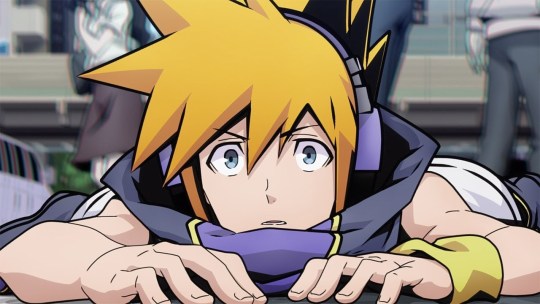
i have to admit that i have a knee-jerk resentment towards a lot of the twewy franchise outside of the original game. every port and remake and reimagining of the original is simply worse off because something fundamental about what made the original experience so fantastic is removed. granted, this is often out of necessity for it no longer being a DS game, and from a business perspective, something like the anime adaptation only makes sense when a sequel is coming out practically immediately after the anime ends. still, in regards to these rereleases, i can easily see them as things that only add to the franchise rather than remove from them. the mobile port, despite screwing with the art style and the gameplay, added new music that is on par with the original game's score. the anime adaptation, despite its truncation, occasional mischaracterization, and format the story was not made for, looks pretty great and is still fun enough to be an effective recap, which was its precise purpose. it is much harder to say the same for final remix.
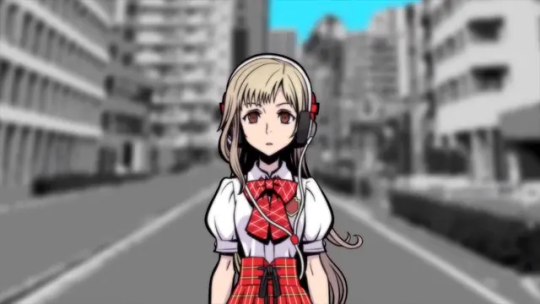
final remix is a port of a port; it maintains the streamlined and exponentially less engaging gameplay of the mobile version. granted, it comes with new pins which work well enough with this new base, but that doesn't change the problems i have with these fundamentals. to make up for that (as well as bridge the gap between it and neo), final remix comes with "a new day": a continuation of the story that is necessary to experience in order to understand neo.
to be blunt, a new day is where my previously mentioned resentment began. the story it tries to tell is so emphatic on its mystery that it foregoes any actual depth. as something that is expressly being tacked onto the original story rather than its own entity, its poor quality leads to directly detracting from that story.
the reaper's game (for og twewy at least) was meant to act as a symbolic prison for neku that colored every bit of his progress. yes, his character development is fairly blatant, but if anything, it benefits from that. the framing of the reaper's game actually makes the arc more grounded in how arduous it is, in how it was so much longer than neku could have ever expected, in how it hurt in all the ways he was scared it would.
it's all perfectly embodied by the fact neku is still wearing his headphones when the original game ends on the sublime emotional note of him taking them off. it's careless storytelling, to such an extent that it colors everything that came before it as the last canonical events we get to see, made all the worse by how it (and consequently, the game) ends with Neku dying. again. the only thing that keeps me from being completely outraged at the comical disregard of his arc is that it at least doesn't take away his emotional development.

there's also the iffy characterization overall, once again to serve a mystery the plot cannot afford to answer the larger reaching implications of. mind you, there's nothing outright OFFENSIVE about its portrayals (i actually think fake joshua is the best example of characterization in the whole thing; it's fun to show what a character is by what they aren't), but it's all just so vapid. forgive me for being smarmy enough to use an antimetabole, but when you go through a whole-ass video game that has its plot function in service to its characters, playing such a blatant sequel-bait that has its characters serving the IDEA of a plot feels like a disservice to those characters. if there's a connection to be felt, it's not indicated or made stronger by what happens here; it's all for the sake of hype.
i'm rambling, but hopefully that embodies my emotions going into neo comprehensively enough. i couldn't help but see a new day as utterly counterintuitive, and as a result, i had my typical territorial nature for my favorite things cranked up to twelve. i couldn't even fully trust the original staff with this game. for a while, i couldn't shake the feeling that the franchise of twewy outside the original game tarnished my experience with it. i did everything i could to convince myself to go full "death of the author": everything that isn't the original game simply isn't canon. but that didn't feel right to me, so i still kept this deep curiosity in me. then, about two and a half years after its release, i started up neo and spent my winter break exclusively on playing it through to the end (college made it so if i didn't finish it then, i'd have to wait till the summer).
this FINALLY leads me to my thoughts on the game this post is supposed to be about.
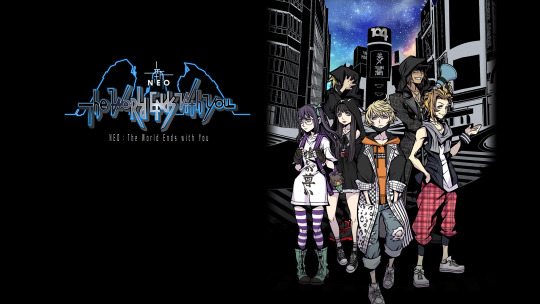
in a word, neo feels derivative. mind you, that's by no means the full story. for certain aspects, that description is either deeply unfair or outright untrue; for others, it's frankly generous. holistically, however, it feels like a continuation of what twewy had to offer, when it could've been an evolution. this by itself would make it worse than the original, but then there are times where it can't even accomplish that much.
on that note: the presentation.
og twewy didn't just have a fantastic style, but phenomenal direction. it was a multi-pronged refutation of the idea of "style over substance". the pause menu alone is so informative, yet so digestible because of its adherence to the game's style, what with its inspired choice of music and cute lil thumbnails for all the menus you can navigate to from there. there's also accounting for what players will most often check the menu for and an effort to make such features particularly accessible. the shining examples of this are dedicating nearly all of the top screen to the map and the fact that all the combat options aside from the pins (your level, partner behavior, game difficulty) are available on that screen, rather than hidden in another menu. hell, credit where it's due, the rereleases' version of this menu are all just as good; the attempt to depixelize the visuals makes it look a little too much like a gacha game for my liking, but absolutely nothing about it was changed in such a way that it becomes harder to navigate
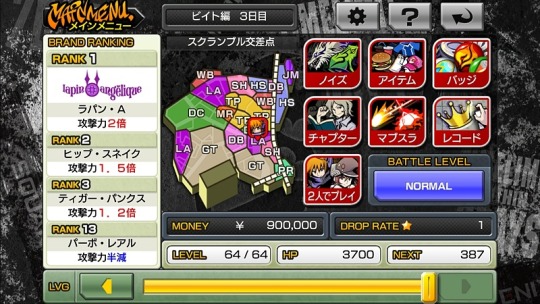
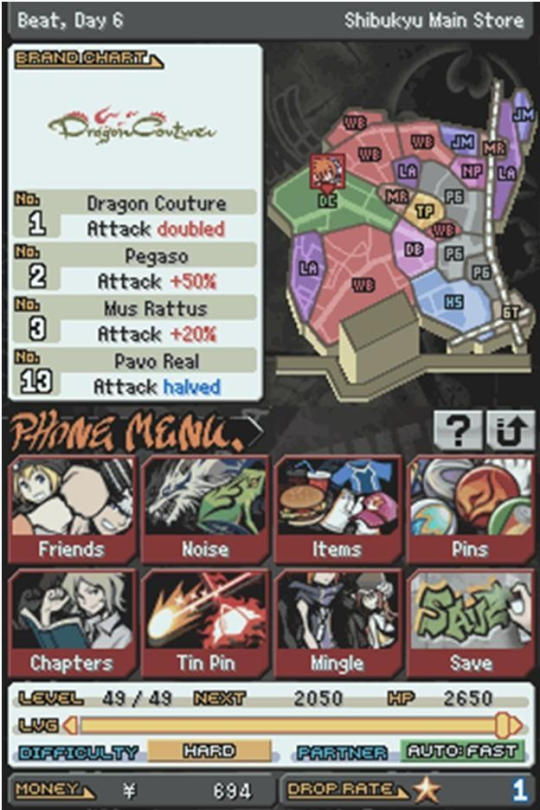
in general, i think ui/ux design is way more important in games than it's given credit for, though that's undoubtedly changed in recent times. it's always been listed as a separate career from other graphic design jobs, and rightfully so, but for games especially, it can't be stressed enough how much they make or break a game's flow and "vibe". fact of the matter is, a significant chunk of a player's time is going to be spent in menus no matter what. i'm sure there's exceptions to this, but all i can think of is very primitive examples like pong which obviously don't apply to what i mean. as a result, making those menus feel fun and/or natural to use elevates the entire experience in ways even the most diligent game developers might not realize. an article from gamesradar has a translated quote from persona 5 director katsura hashino which really emboldened my feelings on the topic
"In Japan, UI design is often handled by new employees. ... Top level designers are usually in charge of characters and background graphics, with the UI being secondary. I think that’s a mistake. That’s why Atlus' UI designers are paid so well."
(side note: as great as the menus in p3r mostly are, the change for the in-battle menu from the revolver chamber is criminal. i know they still kinda have it, but i still prefer what the original did)
with all that said: neo twewy has three pause menus.
the first menu, which i will call the main menu, is where most of the options that relate to gameplay are. your current objective, social network (no jesse eisenberg in sight), equipment, map, and collectible progress. each of those five things i mentioned are their own menu within this menu, except for equipment which is actually two menus in threads and pins (to be fair, just like twewy).
the second menu, which i’ll call the pause menu, has all the shit that give off system setting vibes. saving, loading, going to the title screen, volume control, subtitles (always yes), voice track (we’ll get to that), the works. worth noting that this menu has absolutely no style to it. it is laughably barebones. sauceless, if you will.
the third menu, which i’ll call the combat menu, has all the combat options twewy had at the bottom of its main menu. this menu is also pretty lacking in sauce, though i suppose there’s only so much that could be done without it feeling obtrusive.
an insane person would argue this is a good translation of the immediate access in twewy’s ui. this division means less navigation is needed for certain option and it makes clutter a non-issue (in theory). while i’m sure this is true for some, for me, it became a consistent headache which would often undermine what i think are its design goals. the main menu’s subdivisions are a good example, but i actually didn’t have too much of a problem with it since switching between the menus was fairly snappy. the pin menu, however, was COMICALLY clunky. it becomes far too difficult to navigate your list as soon as week 2 starts. neo is a home console game, so there is zero need for a single pin to take up THAT much space on the screen, especially when that same pin at a different level of progress is listed separately, effectively doubling the amount of shit you have to sift through. the attempts at giving me shortcuts and filters ended up only confusing me. by the end, i resorted to exclusively consulting the full list every time, because even if it was tedious as all hell, at least i understood it and could eventually memorize the positions of things.
granted, it’s not all bad. you can actually access the combat menu while you’re in the main menu, so you can experiment with your level and view the drop rates in the noisepedia simultaneously. this version of the map, while it takes extra steps to access, also has features twewy’s map did not, namely the ability to see the kinds of noises that spawn in an area. you can even zoom in and out! for some reason!
these undeniable improvements are not only things twewy did not have, but in some cases (i.e. the map's new features) couldn’t have. however, it’s still missing the forest for the trees; the fundamental flow is still so disjointed that these features feel like a bandage on a tumor. i fully concede this next complaint is at least partially on me, but i cannot tell you the number of times i pressed the button for the wrong menu. because each menu has important shit that i need frequent access to, my muscle memory for the “i need menu things” neurons are always confused. if i’m not wasting time by going to the wrong menu, i’m wasting time by hesitating on pressing any button in case i’m wrong.
i’m being cruel here to an extent, and i acknowledge that. in isolation, these problems aren’t even a fraction as damning as i make them out to be, but when it’s something repeatedly experienced throughout the entire game, i cannot ignore how i dread having to interact with these menus and how they color my experience. granted, you could argue these complaints refute my thesis statement on neo being derivative. it may have failed, but is this not neo trying something new? to that, i would make the distinction that this is not a case of neo evolving, but rather, simply adapting.
allow me to branch back out to the more general subject of the game’s presentation.

i am by absolutely no means going to be calling the presentation of neo bad. that might be shocking to hear after me going so hard on the ui of all things, but i'm not an idiot. the soundtrack is a delight ("the beginning of a happy life" is genuinely, no bullshit, honest to god one of my favorite vg songs i have ever heard), the visuals are never any worse than ok (fret's design is by FAR my favorite, but i also liked shoka, rindo (mainly just his mask continuing the theme of neku's "hear no evil" with "speak no evil"), and susukichi), and when the two combine, it consistently achieves a familiar vibe throughout.
VERY familiar.
again, the presentation of neo is not bad. i would go so far as to call it good overall. but i genuinely struggle to think of any way it substantially iterates on what twewy has to offer. from where i'm standing, it feels like a complete copy-paste (with one exception that i swear i will get to soon cuz this is now like my third time alluding to it).
it's a bit of a mainstream example, but when you look at something like final fantasy, there's a clear throughline in the presentation of pretty much the entire series. even at its most vibrant and cutesy, there's this particular breed of gothic or sci-fi or—and i truly do not mean this disparagingly—edgy you can feel in the foundation of a final fantasy game. conversely, even at its darkest, final fantasy has its own brand of whimsy and bombast in chocobos or summons or the bajillion leitmotifs throughout the franchise. through it all, final fantasy has maintained a strong fundamental identity, but has managed to express it in a myriad of ways that, rather than dilute said identity, only bolster and refine its spirit.
i use final fantasy specifically because of its similarities to twewy. granted, these similarities are largely surface-level, but that's also kinda my point. final fantasy as a franchise achieves the variety it does through acknowledging what is fundamental to it and innovating off of that. by contrast, twewy (the franchise, not the game) is afraid to change its spirit and seeks purely to preserve it. because of that, the only way you could really differentiate twewy (the game, not the franchise) and neo at a glance is because of the hardware they are on. acquiescing to the merciless march of time, rather than embracing it.
that's why i still think my complaints about the ui ultimately fall back on the critiques of neo being derivative. while the problems with the ui in isolation seem like the developers trying something new, when you look at neo holistically, it is so clearly just an attempt at merely adapting, and sometimes it feels like neo fails even on that level. it isn't even innovation by necessity; every change feels like a sacrifice more than anything.
and on that note: gameplay.
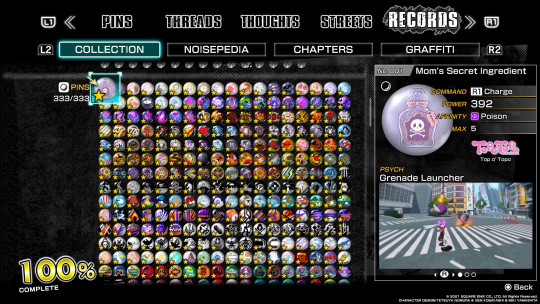
i would say i generally enjoyed playing neo. the overworld exploration is very bog-standard, but i still appreciate it. remind is cute (it and telewarp's mechanics are obviously scripted but successfully "feel" cool to use) and dive fights are cool. i didn't mind the lack of fast travel, and in fact ADORED beat's soundsurf. having it add to your groove makes so much sense it hurts, and i love what it does to the music. but all of this is kinda window dressing when compared to the combat.
i'm sure my utter obsession with rpg (especially traditional rpg) gameplay aids my love of neo's combat, but i think most people can appreciate the gameplay loop. assigning party members to specific buttons is an undeniably fun concept. the hyper-customization of the combat is also something to be admired (to an extent); i'm sure i'm not particularly special for this, but i adore any opportunity to play a game "my way". the pin list is a teensy bit bloated with repeated ideas but with a higher number and/or different and somewhat arbitrary "element", but i sincerely love it overall. with how diverse the ideas are, there's a shocking few that i would consider objectively worse than the others. for example, the strength of the game's combo system "groove" means that a pin having a lower power doesn't actually make it necessarily worse, since less damage per attack allows for longer combos, which allows for more liberal and consistent use of the special moves unlocked by reaching the 100%, 200%, and 300% thresholds. inversely, as a compulsive grinder, the game's progression felt fairly natural even when i was pretty blatantly overprepared. fights are incredibly busy, and the boss fights especially are designed so that a single mistake can become a slippery slope of punishment. i died fairly frequently, particularly from getting too big for my britches and taking on a reduction chain i just couldn't handle. thus, fights never felt thoughtless the whole way through, which i was frankly REALLY impressed by.
i would accredit each of these compliments (or a stronger version of them) to twewy (to the point where i'm strongly tempted to derail this whole thing into how much i fucking love twewy's gameplay), but to its credit, neo does take different ways to get there in a lot of cases. to be doubly fair, though, as i've previously stated, these different approaches feel like they needed to happen rather than resulting from a distinct and passionate vision. to be TRIPLY fair, though, what's here has so much polish and depth that there was clearly some kind of passion present. my mind made a strong connection to kingdom hearts; i am not a big kh fan, so that is either indicative of just how similar neo and kh are (that someone like me could point it out) or how ignorant i am to action rpgs (accusing neo of being similar when it's really not). i'm open to either option.
the hyper-customization also feels like a double-edged sword, in that there is virtually no difference in how each of the six party members play. making your party members distinct from a gameplay perspective is INCREDIBLY important, because it's such an effective tool of storytelling. for better or worse, how a character performs during gameplay will directly influence how a player will view that character holistically. if, either by pure luck or bad game design, a character underperforms, a player is inclined to view that character less fondly. while neo's method of little if any distinction seemingly circumvents this slight dice roll, it closes off a unique opportunity entirely and settles for something that feels a little bland. mind you, this doesn't change anything about what i liked about the game's customization and customization as a whole. i do believe, generally, that the more customization the better, but that can't be an excuse to homogenize the party members.
none of how the game handles levelling up and stats really helps this. yes, characters will have different tastes in terms of food (leading to potential bonuses on top of the stat increases that food already does), and some clothes will have secondary benefits exclusive to certain party members, but it's not nearly enough.
i'm tempted to say that the solution to this would be to find a better balance, and that is still true on a fundamental level, but i also don't think making party members distinct and customization are mutually exclusive, or even necessarily things that mitigate the capacity for the other. if you want to go as extreme as what neo attempts, then yes, a focus on customization will undermine uniqueness, but there's also ways to let them heighten the other. in twewy's case, the dynamism of neku's gameplay vs the static "gimmicks" of his partners spoke not only to the personalities of each character individually, but also of neku's relationship with those partners and with people as a whole. more contemporary and popular examples of this would be pokemon (especially nowadays with nature mints and streamlined ev training) and persona (especially 5 royal).
the latter of the examples i bring up is an interesting one to me: taking advantage of a protagonist who is a canonical blank-slate (not to say joker or any persona protag from 3 onward has no personality, just that they are wild cards) to let them fit whatever mold the player wants. it's a big indicator of what i mean when i say that customization and uniqueness can coexist, because in this case, they're two almost completely separate spheres that manage to function without overpowering the other. when they DO interact, such as with the intended evolution of the mc's personas or the customization allowed for non-mc party members, it only enhances what it touches.
i should stress, despite these critiques, that i think neo's gameplay is good. i had fun with it. there are aspects of it, such as its pin selection, that i found memorably impressive. but i want to stress why i stick so strongly by my thesis—that neo is derivative—even for its best aspects.
and on that note: the story.
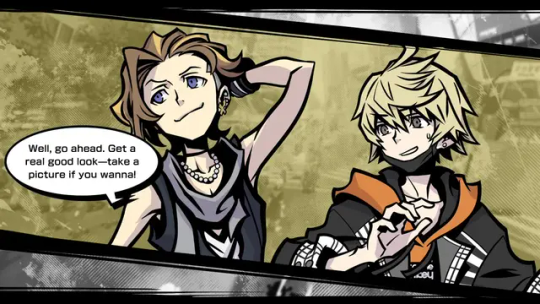
let's get the big thing i've been alluding to out of the way: i ADORE neo's localization. i really, truly, sincerely think there wasn't a single time in the entire game where i felt some piece of dialogue was awkward, and that is not only a compliment for the localizers, but for the writers as well. don't get me wrong, i could sometimes notice that things were localized, but that realization never jarred me. rather, it made me that much more confident about what that piece of dialogue could tell me about the character saying it, the situation they're in, and/or their relationship(s) to whom they're talking to.
i won't act like it's absolutely perfect, of course. however, my complaints come from failures to achieve the goal of localization, rather than with the innate nature of the practice. for example, probably my biggest hang-up on it is that it undersells a lot of the sentiment when shiki and neku finally reunite, though the voice acting is partly responsible for that (likely moreso the voice direction rather than the actors themselves, but i can't say for sure).
back on the positives, i do find the english voice acting pretty good. miranda parkin as nagi is my personal highlight; her performance reminds me a LOT of erica lindbeck's futaba sakura, and you should absolutely look into her work on her youtube channel "ParkinArt" when you get the chance, because she is superbly talented. shoutouts also go to xander mobus as kubo (i struggle to think of a sleazier voice) and pretty much every returning va.
in general, i am pretty massively defensive of localization and localizers; whole lotta people who don't know shit spouting, well, shit. to be fair, i'm not much better, but at least i'm on the side of the people who do this shit for a living. and i'm also on the side which appreciates those people for the work they do, because i can't help but feel like it's really fuckin hard. you're not just translating the literal words, but finding ways to synthesize it to maintain the SPIRIT. This short video by "Jehtt" about the opening line of Sonic Adventure is an excellent example of what I'm talking about.
youtube
as for the content getting localized itself, final remix (and specifically a new day) made it clear that whatever sequel comes out, it's going to be some kind of direct continuation of what's been established, rather than a self-contained story in the same universe or something along those lines. personally, i would've preferred the latter if a twewy sequel HAD to exist, and to its credit, my favorite things about neo twewy's story tend to be the things which THEORETICALLY make it stand on its own. obviously, your enjoyment is enhanced if you play the first game, but there's enough in neo to make it possible for someone who doesn't to still understand it.
for example, new characters are fun, even if occasionally half-baked. i'll get the riff-raff out of the way: the shinjuku reapers felt like goofy personifications of gimmicks that served their purposes well enough, coco is a bit less annoying this time, tsumugi is hilariously half-baked after being hyped up as much as she was, hazuki... exists, and i struggled to see any of the other team leaders as more than an impetus for other characters (though i am DEEPLY grateful kanon isn't as bad as she could've been). speaking of which, how about those characters?
my favorites were nagi and fret; i see their concepts as a bit tropey, but executed well all the same. the ways their arcs intertwine were surprisingly compelling; nagi's dislike of fret wasn't just a weird gag, but an inevitability of fret's compulsion to put up a front and nagi's keen perception and hatred of "fake" people. once nagi learns why fret puts up this act as he makes an effort to move past that instinct, they start bonding almost immediately as she tells him more about her inner workings and that she'll take care not to be so judgmental thanks to his influence. the reveal that she got fret on elegant strategy after the events of the game made me smile way more than the game trying to get me to like rindo and shoka as a couple ever did.
on that note, i could take or leave rindo as a protagonist, and in general, my interest in the shinjuku reapers (especially shoka) waned as they became more significant. that's not BECAUSE of their significance, mind you, simply that they ended up disappointing me in one way or the other (with the possible exception of kaie who was just kind of a silly little guy). it comes back, yet again, to my thesis on this game failing to meaningfully iterate. i understand and agree that there's a lot of value in establishing parallels between characters, even if the plots of their stories are disconnected. i would go so far as to say it's ideal to make a sequel expand on the subtext of what's been established like that, as long as it and what's new bolster each other. in the case of rindo, i struggle to appreciate things about him that aren’t some extension of neku when he was a protagonist. i found his arc about making his own decisions sudden and a bit inexplicable, especially with how blatantly it was stated. felt like a case of saying a character was having a specific arc without actually giving them that arc.
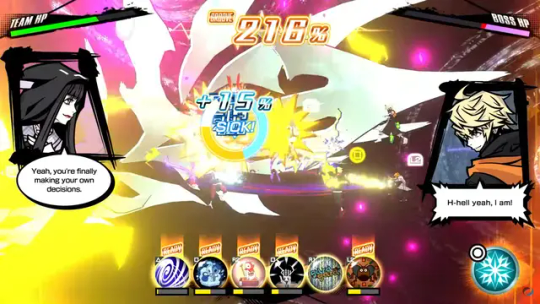
as for shoka, i do like her more than rindo. in fact, it’s her relationship with him that made me lose interest; it felt like all the things that endeared me to her, like her relationships with the other shinjuku reapers and her brand of snark, got pushed to the side in favor of said relationship. it dominated everything else about her character in a way it felt like it just didn’t with rindo. granted, this could just be because he’s the protagonist, and her “snark” is a surface level reason to like her. however, i don’t find that first concession to be an adequate excuse, and it was precisely her personality that got me interested in the character to begin with, only for it to feel discarded (albeit probably not completely, i’m sure there’s a cute lil moment or two i’m forgetting). considering shoka’s love of gatto nero and shiki’s presence in the game, i imagine the parallels between the two have to be somewhat intentional, including with their relationships to their respective mc. like with rindo, these parallels make it hard for me to appreciate the character, but unlike rindo, shoka’s parallels seem to actively oust the things unique to her, as opposed to rindo’s leaving little opportunity for appreciable distinction to begin with. again, i ultimately prefer shoka, as tis better to have loved and lost than to have never loved at all.
that just leaves the three elephants in the room/party: all of them are returning characters. two of them are characters you played as in twewy.
i do want to make it clear that even at my most territorial, i don't think i was ever completely against the idea of there being returning characters; if anything, my ideal twewy sequel would actually feature characters like joshua or hanekoma more prevalently than they were here. rather, much like most things, it comes down to how you implement them, and neo does so in a way that pretty blatantly relies on them. even that isn’t a necessarily a bad thing, but remember what i said about this story attempting to stand on its own?
what shocks me about their sheer prevalence is that very little of it feels necessary. i don’t get the feeling that any of the og gang were needed to make this story work on a thematic level (as happy as a lot of their scenes together made me), and in fact, as i alluded to with rindo and shoka, it actually seems to impede or dampen a lot of what the game is trying to go for. i see it as perhaps the single most blatant example of my thesis statement. neo plays with the concept of a self-contained story, but is unable to let go of what's already there, innovate enough on the franchise and original game’s core, and pull through with something standalone, because it seems generally unwilling to embrace change, and consequently, key aspects of creativity and what makes a good sequel. i understand if others don’t share this opinion, but to me, it really feels like neo only changes when it has to, and that reflects in the changes it makes as well as the ones it doesn't.
and on that note: the conclusion.

sorry this feels so disparate. i definitely wouldn't call neo a bad game, and in fact, i think given some time, i can comfortably call it good. plus, i can, after some difficulty and deliberation, say it and even final remix's existence only add to og twewy. impulsive territorialism be damned, it makes me happy to see stories and characters i love be added on to like this. the aspects i consider bad, even if they might be fundamental, are not enough for me to avoid embracing and appreciating the good. my silly little headcanons are not “threatened” by things like final remix, even if it felt like they would be in the moment. it is still possible to imagine all my favorite characters living happily ever after with each other, even that cunt with the mop for hair joshua, and if anything, certain scenes in neo only add to those delusions. i may have complained about them, and i do stand by those complaints, but i cannot deny how much i love them in isolation. i think the only thing that could've made me hate them is mischaracterization, but the only instance of that which stuck out to me (neku and shiki reuniting) seems to be a translation issue, and the real sentiment of the scene aligns far more strongly with my views of the characters.
that said, i'm still definitely disappointed by it all. neo's derivative spirit felt very pervasive to me the whole way through, and by the end, i felt a strong urge to replay twewy. that's not a necessarily bad instinct to have after playing a sequel, because it's the idea of "wanting more". it is, however, bad in this case, because it was a mix of that and the idea of "wanting better". i wanted to play something where these good ideas were new, or better yet, something where the new ideas were good. as it stands, i'm left the slightest bit hollow; just enough to be noteworthy, but i still feel like a dick for bringing it up.
i'm happy i played this game. i may very well play it again in the future. there's aspects of it i like to the point of loving. and yet, i hesitate to say i like it.
my feelings on this game continue to be jumbled, even after all this. still, writing a lot of it out definitely helped, and it was really fun to make! thank you oh so very much for reading; i hope you enjoyed it!
oh, and i would rather rip my dick off than play scramble slam again-
26 notes
·
View notes
Text
AS IS ABOVE, SO IS BELOW - ASCENDING / DESCENDING ASPECTS
“ That which is above is like to that which is below, and that which is below is like to that which is above. “ - Latin-Translated Second Verse of the Emerald Table; a Hermetic Text
Let’s talk about Ascending / Descending.
The idea of Ascend / Descend is not new to Homestuck. Prior to the Scratch, there are many characters who Ascend and Descend at various points, be it a descent from the sky, or an ascent to power.
Ascending and Descending can be metaphorical, literal, or both.
What does this mean in comparison to the Aspects themselves?
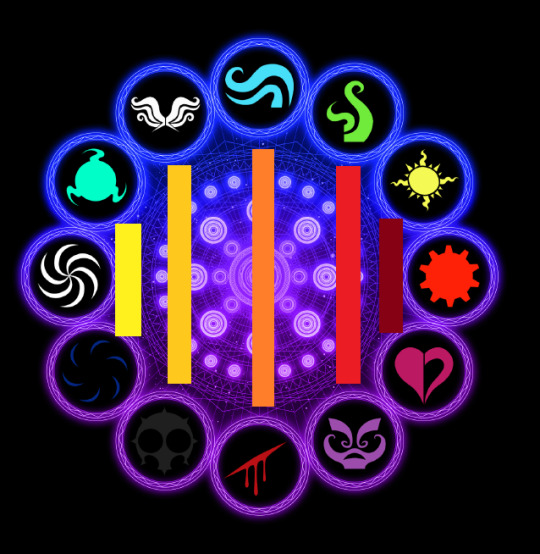
It is the relation of those aspects who across the Space-Time Line, as seen here.
The very basic idea of Ascension is becoming more Divine, Heavenly you could say.
While the idea of Descension could be a falling from grace... or it could simply be, Falling to Earth. Hell is still a divine place, no matter it demons, so to fall from divinity is to fall to morality, to Fall to the Earth Below.
As seen above, the ULTIMATE DESCENDING ASPECT is the Blood Aspect, and the ULTIMATE ASCENDING ASPECT is the Breath Aspect. They are CARDINAL ASPECTS, thus are both reflections and opposites.
Breath is the Heavens, and Blood is the Earth, and those aspects associated are henceforth the Heavenly Aspects and the Earthly Aspects.
(I swear, there’s anime about something like that somewhere)
... So what does this mean exactly?
“ That which is above is from that which is below, and that which is below is from that which is above. “ The Original Arabic Translation of the Second Verse of the Emerald Tablet.
There is enough similarity between Ascending-Descending aspects, that if we take certain conditions away--they would be indistinguishable from one another.
Heaven is a seat of Divinity from the perspective of Earth, but Earth is a Divine creation from the perspective of Heaven; both are holy for they are all made by their gods, not by their declaration.
Just as the idea of Earth being a place of suffering, so is the divine realm of Hell, an after place made of suffering.
Thus Earth will always be the basis of which we judge Ideality.
As is above, so is below.
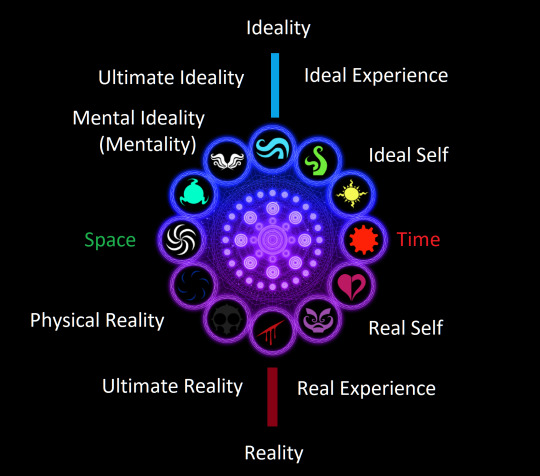
Breath to Ideality, the Heavenly Aspect, vs Blood to Reality, the Earthly Aspect
Hope to Ultimate Ideality (Imagination / Divinity) vs Doom to Ultimate Reality (Death)
Mind to Mental Ideality (Mentality) vs Void to Physical Reality
Life to Ideal Experience vs Rage to Real Experience
Light to Ideal Self (That which we see of ourselves; Consciousness) vs Heart to Real Self (That which we present; The Unconsciousness)
I can note this from the Zodiac Aspect all I want, but it would mean nothing if I can’t apply it to Homestuck, now would it?
So let’s see how Descending / Ascending Aspects handle in Homestuck proper.
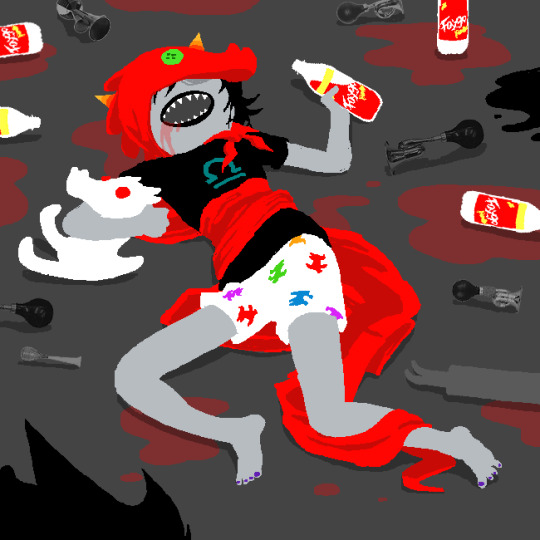
Terezi Pyrope is a Seer of Mind, but as seen in this picture, she’s blind folded herself (obscured vision), passed out on the ground (Blacked out), and looks generally like someone you want to Avoid.
Mind’s descending aspect is Void. Mind has been Grounded here.
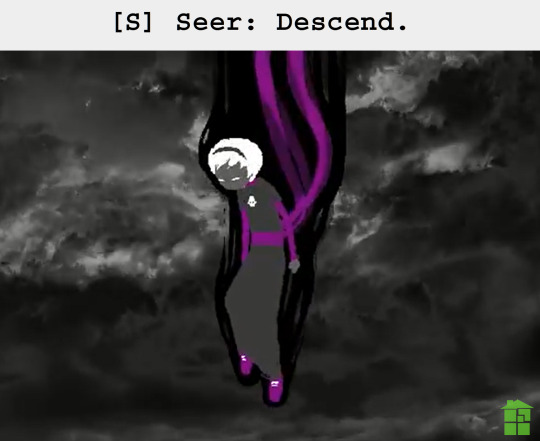
I don’t have to describe this one, the video is literally “Seer: Descend”.
Rose has gone Grimdark (Darkness), from seeking INTIMATE knowledge regarding the CORE of unknown entities. This not long after learning her mother was murdered, and thus is on a revenge quest for the RELATIONSHIP. While she did BLACKOUT as Void tends to do, her darkness isn’t obscurity, but a shift of AESTHETICS.
She has not changed in PERSONA, we are merely seeing another FACET to her, though its been clearly and magically decorated to fit her mood.
Her aspect is Light, and it has Descended to the Heart Aspect; which is the Void’s Reflection Aspect.
Light has been Grounded here.
But surely its not just seeing Ideal Aspect Descend, what about some Ascending Aspects?
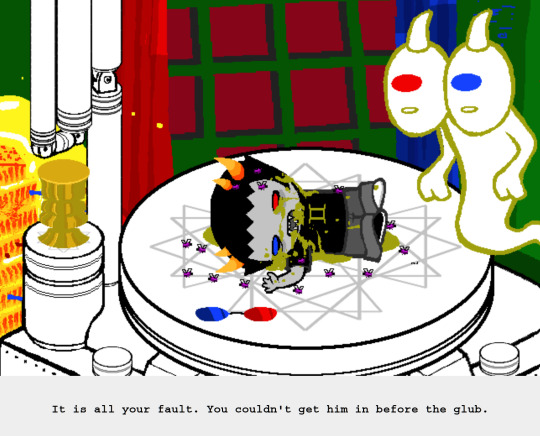
...
Well, Doom’s Ascending Aspect is Hope, and everything by this point was Sollux’s Hoping to either save the Troll Race (Which didn’t happen), or getting into the game before the VAST GLUB (which also didn’t happen), and hoping to rely on his friends... which got him killed.
And its... its Doom. You’re only gonna get so much with Doom.
Doom has been Raised / Razed here.
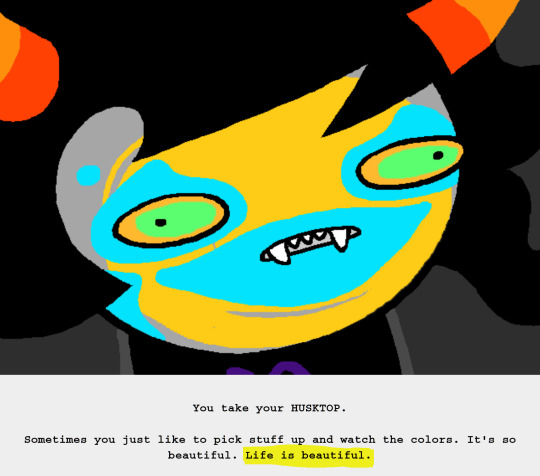
Gamzee is at his least violent in his first introductions, his most ideal as many could say. He’s relatively WELL-OFF, he’s seemingly has GOOD EXPERIENCES with everybody, he’s here for a GOOD TIME. He tends to eat Sopor PIES (Mind that every Life Player is associated with Baking). He’s also nigh UNKILLABLE, the stupid fucking bastard man.
He is a Bard of Rage, and Rage’s ascending Aspect is Life. Rage has been Raised / Razed here.
=#=
- The fact that Gamzee is on here gives a certain rule to Ascension / Descension in Aspects.
That the Ascending / Descending is often devastating to the Character themselves, as it means that they’re under a kind of duress. The conditions that separate an ascending / descending aspect from the other have been removed, and now the scale is going wild.
That isn’t to say that acting as the other aspect is bad. No Aspect is inherently bad, its only when you try to act as something without understanding yourself, that it becomes a horrible thing. Moderation or Balance, you could say.
There is no Balance when Ascension / Descension occurs.
- This does appear similar to the Inverse Theory. However, I don’t believe in switch classpects to their opposites when under duress.
To clarify, Ascending / Descending is the removal of Conditions of Balance. You are still your Classpect, but its either been “Grounded” (In the case of the Ideal Aspects) or its been “Raised / Razed” (In the case of the Reality Aspects); the line has blurred between the Descending Aspect and the Ascending Aspect--that is what is causing the problem.
- It should also be noted that Time and Space players do run into Ascending / Descending Events, but its less an aspect grounding or an aspect rising, than it is a shift of circumstances.
27 notes
·
View notes
Text
Some thoughts on The Winchesters after episode 5, and on self-reflection, and what it may tell us about Dean’s situation:
This was originally written as a thread on Twitter, which is (unfortunately) where I have historically done most of my meta writing. (Here is a collection of my Twitter posts about this show, including a few long meta threads.) I’m trying to get better about crossposting to tumblr ASAP when it's manageable.
All this to say that if this reads like it’s written in bite-sized chunks… that’s why. Also, I am writing this at midnight from an iPad lol.
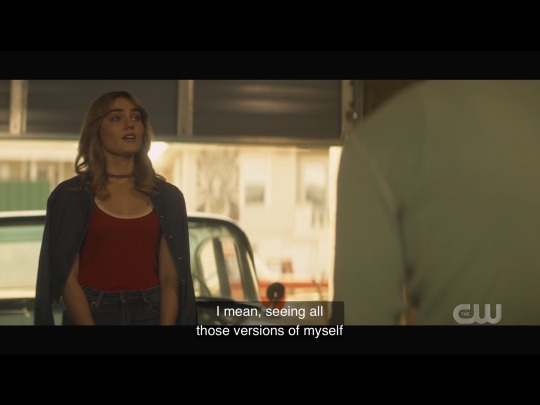
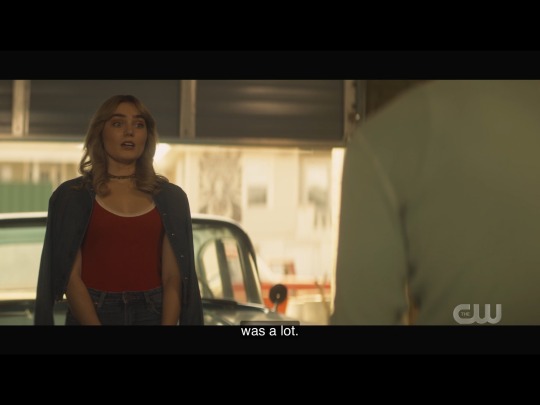
So… This “Dean all the way down” show, if you will. In every episode of this show, its main characters highlight important things about Dean’s life and his relationships with others, as well as the unfinished parts of his story. Here’s a handy refresher, courtesy of my friend Matt.
I am compelled by the consistency of this (to the point of hypothesizing that Lata will be the main Dean mirror of the week in ep6).
I am also compelled by what is shaping up to be one of many consistencies in not only the themes but also the PLOTS of these episodes:
In every episode so far other than the pilot (I think?), someone is taken and trapped physically and/or mentally. Their freedom requires examining who they are as a person and what’s important to them, and/or examining who they are in relation to who they care about, mostly via reflective versions.
2: John, taken by La Tunda who punishes disobedient children & masquerades as Millie
3: Mary, taken by Bori Baba who lures you in with what you want most
4: John & Carlos, taken by a god of “destiny” who wants John to be like him
5: Mary, trapped in her mind by the Akrida
They’re all different situations, but at their core the key to freedom in the plot is always some form of self-reflection.
It’s making me wonder, because… well, we’re explicitly dealing with a narrative that’s cyclical, yes? We know that already, and the show’s not shy about it…
Cycles of violence + parents & children, on a micro level (Winchester family) and macro level (forces wanting to mold you into something you don’t want to be, or control you; Chuck/God as Father, destiny, and now Akrida).
But is it also a cycle in regards to this self-reflection?
Metaphorically, yes. This is what Dean is doing here and it’s why the characters are continuously acting as rotating mirrors for him. But what I’m beginning to wonder is if we’re meant to start taking it as hints to being literal for Dean, the way it is for the characters.
The characters repeatedly participate in self-reflection to free themselves from literal traps, and that self-reflections acts as reflection of Dean. What does this maybe tell us about what’s LITERALLY happening to Dean? Can we start piecing together that he’s trapped somewhere and uncovering/telling this story is key to his freedom?
🎶 Like a circle in a spiral
Like a wheel within a wheel
Never ending or beginning
On an ever spinning reel 🎶

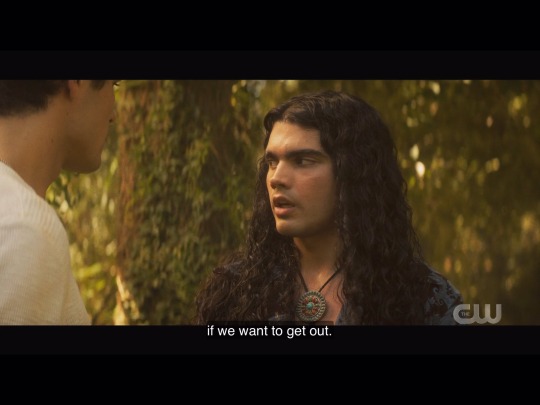

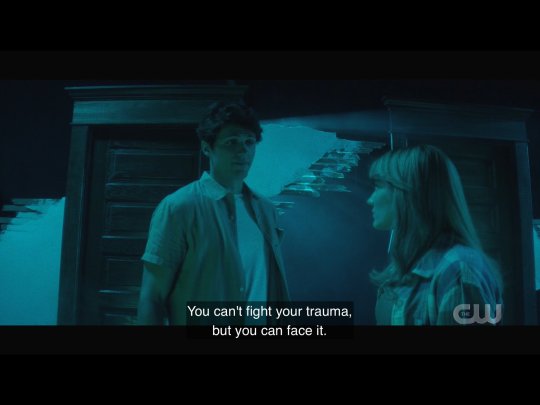
They keep being trapped in places where they have to face aspects of who they are, who they love, and what haunts them. Maybe that’s the literal situation Dean could be in (fake Heaven trap?) and is part of the reason for the story he’s telling. Examining himself to break free.
I don’t know how front-facing in terms of the plot this may be. It could remain metaphorical. or be an extra-narrative reference about the prequel being its own thing but also a quasi stepping stone to a sequel.
But Dean being Trapped is, at this point, feeling pretty implicit.
Combine this with how mirror and reflective imagery is starting to visually pop up a little bit more.
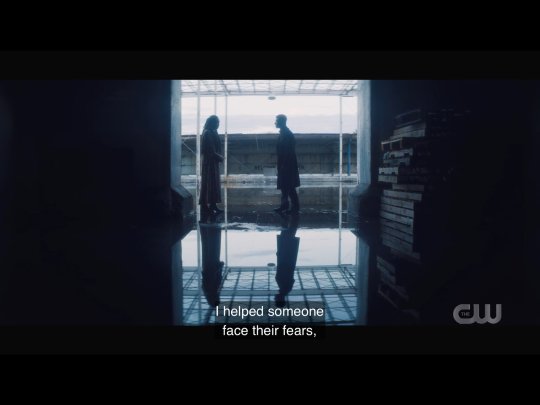
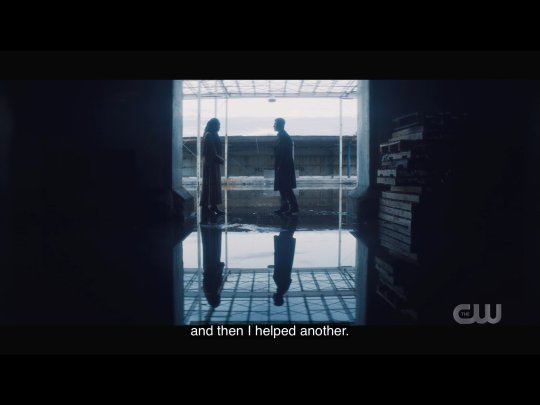
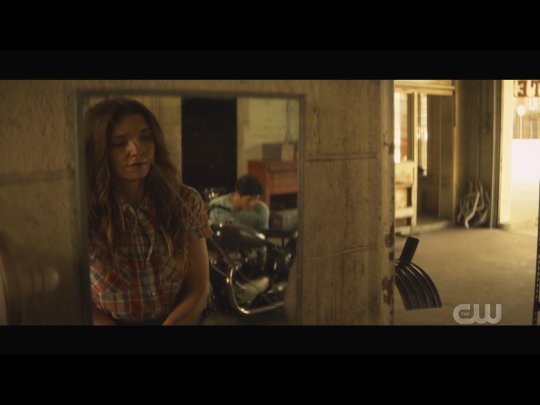
And also combine it with all of the ways Tony’s story parallels Jack’s, and what that could imply about a “Chuck won” through-line… but I’m not getting into that tonight lol.
I am very intrigued. Everything about this is circular, and talking about one aspect kind of tips you into talking about another, which is FASCINATING story construction. So I’m sorry if I repeated myself here!
It’s reminiscent of a triskelion, naturally, a la the necklace in ep2.
Calling it quits for tonight because I am TIRED. Bottom line:
The repeated implication is that Dean is Trapped and doing self-reflection to try to break free. How literal that may or may not in terms of where/when he is remains to be seen, but… it’s feeling more and more pointed.
And I know I’m one of the foremost Chuck won preachers, okay, but I do try not to let it color my view of this show too strongly. I can’t help it that the material feeds me at every turn ¯\_(ツ)_/¯
#spnwin#spnwin meta#the winchesters meta#the winchesters#spnwin 1x05#the winchesters 1x05#when will I post my very long 1x04 meta on this website...#char writes things#dean winchester#unreliable narrator my beloved#hallofmirrorsnatural
33 notes
·
View notes
Note
I don't know if you're actively answering questions right now but I have a kinda stupid question that I'm curious what your thoughts are on it. If you don't want to answer that's fine tho lol
Basically, uhh. What are your thoughts on Heather going by Cheryl post-game? Personally I'm conflicted about it, because while I understand the explanation given in-game, part of me feels like it partially defeats the purpose of being able to become her own person and everything... If she goes back to using the name that Harry regretted choosing because it made him see her as a replacement for SH1 Cheryl. But at the same time, it could also be seen as an acceptance of those before her? Idk honestly.
I wanted to ask you because, well, you've been into silent hill far longer than I, and seem very passionate about Heather as a character, so I figured you might have personal opinions on the matter. As I said though, it's fine if you never answer this because it's super out of the blue
I'll be curious to hear your thoughts if you do answer, though!
Hey there! I'm like, in a perpetual state of flux, but I do try to answer questions whenever I get them! (If I leave them for too long, the ADHD guilt sets in and then I never do it, lmao.....). And, it's not a stupid question!
I agree that I always found it a *little* bit head-tilty for the reasons you mentioned-- Harry himself did acknowledge that naming her Cheryl was a gesture borne of wishing things could be exactly the way they were, when the truth was that Cheryl as he knew her would never again exist. But I also think the other thing you mentioned holds weight-- a big aspect of SH3's plot imo was Heather regaining a full awareness of self (something she'd previously been repressing for her own safety, and unconsciously running away from her entire life) and coming to peace with the fact that her former "selves" were still part of her, even if she'd grown and changed.
youtube
This song (which is one of my all-time faves, tbh!!!!) really captures the aching sadness at the core of Silent Hill 3 for me. It's written as though from the point of view of Heather at an earlier point in her own lifetime, but symbolically I think it's also representative of Heather's relationship with Cheryl/Alessa-- not just as literal people, but as periods of time that no longer reflect her current feelings and understanding of the world, yet still EXIST within her nonetheless.
SH3 is, after all, a coming-of-age story-- a huge part of it is about grieving for the person you once were but are no longer. That moment of feeling disconnected from your childhood-- whether it's due to being unavoidably transformed by trauma, realizing that you're estranged from people you once loved in a way that will never be fixable, having the horrible knowledge that the 'you' people want is not the 'you' that you've become, OR EVEN just the simple passage of time... Obviously, SH3 presents those themes in a VERY literal fashion because Heather is dealing with actual reincarnation and past lives here, but I think when you boil it down to its essentials, that's what it's all about.
And OOF, that really hits me on a very personal level, which I think is why SH3 remains my favorite game in the series.
To bring this back around to your specific question though, I think that the most plausible interpretation of Heather going by 'Cheryl' again is that it's a mix of honoring Harry, and embracing/making peace on her own terms with the past she'd been running from for so long.
From a FULLY in-character perspective, I see post-game Heather primarily only going by Cheryl with people she fully trusts, and retaining Heather as her more commonly-used name (or EVEN picking out a completely new pseudonym, since I guess 'Heather' would be known to the Order now lmfao) for simple safety reasons.
SORRY FOR THE RAMBLING, I hope I actually answered your question! NEVER apologize for asking me to talk about Silent Hill, it's always encouraging to know that anybody wants to hear my unhinged ramblings, haha.
#Silent Hill#SH3#Heather Mason#Cheryl Mason#Alessa Gillespie#kit rambles about silent hill#asks 4 me#music
22 notes
·
View notes
Text
Everything You Need to Know About Pagan Deity
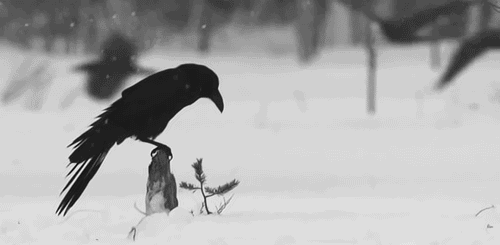
As you’ve probably guessed by now, there are many, many, many different approaches to deity within the wider pagan community. While it would be impossible to summarize all of these different perspectives in a single blog post, this post contains some common themes and best practices that are more or less universal and can be adapted to fit whatever system you choose to work with.
In my Baby Witch Bootcamp series, I talk about the “Four R’s” of working with spiritual beings, including deities: respect, research, reciprocity, and relationship. However, when it comes to gods and goddesses specifically, I think it’s important to include a fifth “R” — receptivity.
If you’re completely new to this kind of work and want to avoid making rookie mistakes and/or pissing off powerful spiritual forces, sticking to the Five R’s of Deity Relationships is a good place to start. The Five R’s are:
Respect. It’s always a good idea to have a healthy respect for the powers you choose to connect with, whether you see those powers as literal gods and goddesses or as archetypes within the collective unconscious (see below). While not every ritual needs to be incredibly formal and structured, you should always conduct yourself with an air of respect and reverence when connecting with deity. There’s no need to humble yourself to the point of cowering before the gods (and in fact, this kind of behavior is a turnoff for many deities), but you should strive to be polite and follow your system’s proper protocol for things like cleansing, offerings, and prayers.
Research. I am of the opinion that you should do serious research into a god or goddess before any attempt to make contact with them. This can be controversial, but in my own experience things seem to go more smoothly when I know what I’m doing. Books are really the way to go for this — the Internet can be useful for connecting with other worshipers and hearing their stories, but it isn’t a good source for nonbiased factual information. I recommend starting with academic sources written by secular experts for a purely historical account that won’t be colored by personal religious experience. Once you have a decent understanding of the basic historical context, look for books by pagan authors who have experience working with this deity. These sources will give you a framework for your own interactions with them.
Reciprocity. As we’ve discussed before, reciprocity is a core value of virtually every pagan tradition. Reciprocity is a mutual positive exchange where all parties benefit in some way, and this quality forms the backbone of all healthy relationships with deity. While we benefit from connecting with the gods, the gods also benefit from our worship. Upholding reciprocity in your relationships with deity means making regular offerings to show your appreciation as well as living in a way that your god or goddess approves of.
Relationship. At the end of the day, connecting with a god or goddess is about creating a healthy, fulfilling relationship. Like any relationship, it takes time and effort to keep the connection alive. The gods are living, thinking, feeling beings just like you and me, though on a much larger scale. Just like you and me, they have likes and dislikes and require certain things from those who want to work closely with them. Try to approach the gods as individuals, and connect with them as you would with another person. This will naturally lead to much more authentic and organic relationships.
Receptivity. To be receptive is to be open and ready to receive whatever comes your way — this is an essential quality for anyone who is serious about connecting with a god or goddess. Connecting with the gods means allowing them a place in your life, whatever they choose to bring with them. It means forming a relationship with them on their terms, and that requires us to give up a certain degree of control. While you should never feel afraid or completely out of control when connecting with deity (if you do, stop contacting that deity immediately), you may very well experience things you did not expect or ask for. Be prepared for these surprises, and understand that when the gods surprise us in this way, they do it in order to help us grow. Let go of any preconceived ideas about what a relationship with this deity “should” look like, and instead let it unfold naturally.
Though there is much more to working with deity than just these values, keeping these values in mind will get you started out on the right foot in your relationships with the gods.
Deity or Archetype?
As odd as it may sound, not everyone who connects with the gods through study and ritual believes those gods to be literal spiritual beings. Some pagans (I would even say the majority of pagans, based on my personal experience) connect with the gods as individuals with their own personalities and agency, but others connect with them as symbols that represent different elements of the human experience. This latter group is working with the gods not as deity, but as archetypes.
The term “archetype” comes from academia, particularly the fields of psychology and literary analysis. An archetype is a symbol that embodies the fundamental characteristics of a person, thing, or experience.
Swiss psychoanalyst Carl Jung argued that archetypes are powerful symbols within the collective unconscious (basically an ancestral memory shared by all of humanity) that arise due to shared experiences across cultures. For example, Jung would argue that Demeter, Juno, and Frigg all represent the “Mother” archetype filtered through different cultural lenses, reflecting the important role of mothers across Greek, Roman, and Old Norse culture. For Jung and his followers, archetypes allow us to connect to latent parts of our own psyche — by connecting with the Mother archetype, for example, you can develop motherly qualities like patience, empathy, and nurturing.
For comparative mythology expert Joseph Campbell, archetypes represented types of characters that appear in some form in most or all global mythology. In his book, The Hero of a Thousand Faces, Campbell identified the “hero’s journey” as the archetypal narrative framework on which most stories, from ancient myths to modern films, are based. (If you’ve taken literally any high school literature class, you’re probably familiar with Campbell’s work.) Like Jung, Campbell has been hugely influential on modern pagans who choose to connect with the gods as archetypes.
Working with an archetype is a little different than working with a deity. For one thing, while archetypes may manifest as gods and goddesses, they can also manifest as fictional characters, historical figures, or abstract symbols. Let’s say you want to tap into the Warrior archetype. You could connect with this archetype by working with gods like Mars, Thor, or Heracles — but you could just as easily do so by working with superheroes like Luke Cage or Colossus, literary figures like Ajax or Achilles, or the abstract concepts of strength and honor.
When pagans worship a deity, it’s because they want to form a relationship with that deity for some reason. But when pagans work with an archetype, it’s usually because they want to embody aspects of that archetype. In our above example, you may be trying to connect to the Warrior archetype to gain confidence or become more assertive.
The biggest difference between worshiping a deity and working with an archetype is that a deity is an external force, while an archetype is an internal force. When you connect with a deity, you are connecting with a spiritual being outside of yourself — a being with their own thoughts, feelings, and drives. When you connect with an archetype, you are connecting with a part of your own psyche. Because of this, archetypes tend to be more easily defined and behave in more predictable ways than deities, although some archetypes can be very complex and multi-faceted.
On the surface, worship and archetype work might be very similar, but the “why” behind the action is fundamentally different.
If you choose to worship the Morrigan, for example, you may have an altar dedicated to her, make regular offerings to her, speak with her in meditations and astral journeys, and/or write poetry or make art in her honor. If you choose to work with the Wild Woman archetype, it may look very similar to an outside observer — you may have an altar dedicated to the Wild Woman energy, speak with manifestations of Wild Woman (perhaps including the Morrigan) in meditation, and write poetry or make art dedicated to this archetype. However, these actions will have a very different intent behind them. Your Wild Woman altar is not a sacred space but a visual trigger to help you connect to the Wild Woman within you. Your meditations are conversations with different aspects of your own personality, not with a separate being. Your art is an expression of self, not a devotional act. The result is a deeper connection to yourself, not a relationship with another being.
I hope I’ve made it clear that archetype work and deity worship can both be very worthwhile spiritual practices, and that each serves its own purpose. Many pagans, myself included, work with both deities and archetypes.
There is some overlap between worshiping a deity and working with an archetype, and many pagans start out with one practice before eventually ending up in the other. Sometimes working with an archetype leads you to encounter a deity who embodies that archetype, which can lead to a relationship with that deity. Likewise, your relationship with a deity may help you become aware of a certain archetype’s influence in your life, which might lead you to work with that archetype.
Making First Contact
First impressions are important. This is true for making new friends, for job interviews, for first dates — and for your first meeting with a god or goddess. In many cases, the way you behave in your first meeting with a deity will set the tone for your relationship with them.
That being said, don’t overthink (or over-stress) about your first impression. You aren’t going to be cursed or punished if you mess this up — at the very worst, the deity might lose interest in connecting with you, and even that can often be remedied with an offering and a polite apology. While it’s always best to get off on the right foot, don’t feel like you need to be perfect.
So, how do you make a good first impression on a god or goddess? Honestly, the rules are largely the same for making a good first impression on any other person. Make sure your physical appearance is clean and tidy — some systems, such as Hellenismos and Kemetic paganism, have special rules for cleansing before contacting the gods, but it’s always a good idea to take a shower first and make sure you’re wearing clean clothes. Likewise, make sure the physical space you invite the gods into is relatively clean — it doesn’t need to be spotless, but take a minute to tidy up before beginning any ritual. Be polite — there’s no need to be overly formal, but you should be respectful. Don’t immediately ask for favors — how would you feel if you met someone at a party and they immediately asked you to do some sort of work for them?
Beyond the basics, it’s wise to make sure you have an idea of who this god is and what they are like before you reach out to them. This will keep you from accidentally doing something offensive. For example, you wouldn’t want to invite them to an altar dedicated to a deity they have a rivalry with. Likewise, you want to avoid offering food or drink that would have been taboo in their original worship. (Of course, there are exceptions to every rule, but when you’re just starting out it’s a good idea to follow the historical framework as closely as possible.)
At the risk of sounding like a broken record: this is why research is so important. Knowing who you are dealing with allows you to deal with them respectfully, gracefully, and competently.
Callings
There’s one aspect of deity worship that is controversial in modern paganism: the idea of being “called” by a deity. This is a question you’ll find many, many heated discussions about online. Do you need to be called by a deity to form a relationship with them? Do deities choose their followers, or do we choose them? How do you know what a call from a deity even looks like?
As I said, this is a controversial topic, but I firmly believe that 1.) you do not have to feel called to a deity beyond being interested in them, and 2.) feeling drawn to a deity’s image, symbols, and myths is a form of calling.
Many pagans do feel like they were called or drawn to the deities they walk most closely with. They may have encountered myths of that deity as a child or teenager and deeply resonated with them, or may have always had an affinity for that god’s sacred animals. They may have dreamed of this deity before knowing who they were, or may have felt a spiritual presence around them before identifying it as a god or goddess.
Many people first encounter the gods in fiction, only for this fictionalized depiction to spark a deeper connection that eventually leads to worship. In the modern era, it’s entirely possible for someone who worships Loki to have first encountered him (or at least a character loosely based on him) in Marvel comics and films, or for someone who worships the Greek pantheon to have first discovered them through the Percy Jackson books. As far as I’m concerned, this is also a valid “call” from deity. The gods are very good at communicating with us through the means available — including fiction.
That being said, just because you don’t already feel a strong connection to a god or goddess doesn’t mean you can’t or shouldn’t worship them. The connection will come with time and effort, just like in any relationship.
Dedication, Patrons, and Matrons
In online spaces such as Tumblr and TikTok, a lot of inexperienced pagans parrot the idea that every pagan needs to have a designated matron and/or patron god and/or needs to be formally dedicated to a god in order to have a close relationship with them. Not only is this untrue, but such restrictions can actually cause harm and/or stunt spiritual growth.
Let’s address dedication first. To be dedicated to a deity means to outwardly declare yourself a servant of that deity, usually with a formal dedication ritual — think of it as the pagan version of joining a convent or going to seminary. It is an outward expression of your devotion and loyalty to that deity. Dedicants are held to a higher standard than the average worshiper by themselves, their communities, and the god(s) they have dedicated to.
Dedication can be a powerful and fulfilling spiritual experience (it’s the backbone of many peoples’ spiritual practice), but it should not be taken lightly. Dedicating yourself to a god or goddess should be a sign of your commitment to them and a deepening of your relationship — it should not be the beginning of that relationship.
Dedication is a lot like marriage. Just like you wouldn’t marry someone you’ve only been on a handful of dates with, you shouldn’t dedicate to a deity just because you’ve had one or two positive experiences with them. Like marriages, dedication can be difficult to get out of — ending your dedication to a deity is possible, but it’s a messy, complicated, uncomfortable process that is sure to shift the foundation of your entire spiritual practice, and not always for the better.
My advice to new and inexperienced pagans is not to even consider dedication until you’ve been practicing for several years. As you begin your journey, your focus should be on exploring your options, forming meaningful connections, and developing a practice that works for you and your unique spiritual needs. Now is the time for experimentation, not lifelong commitments.
But let’s say you are an experienced pagan, and you feel like you are ready for dedication. How do you know if you should dedicate to a given god or goddess?
Dedication may be the logical next step in your relationship with a deity if:
This deity has been an active part of your spiritual practice for at least 2-3 years, with no major gaps in contact with them
You are comfortable upholding this deity’s values for the rest of your life — and are willing to face consequences if you fail to do so
You are willing to dedicate a significant amount of time and effort to the service of this deity
You are willing to face major changes in your life outside your spiritual practice — dedicating to a deity often leads to major shifts that may affect our career, family, and/or relationships
If you answered “yes” to all of the above, dedication may be appropriate. This may seem overly cautious, but remember that dedicating to a deity is a serious, lifelong commitment akin to joining the clergy. For context, it takes at least five years of study and practice to become a Catholic priest, a similar amount of time to become a Jewish rabbi, and three years to become a high priest/ess in Traditional Wicca. If you don’t have the patience to maintain a relationship for a few years before dedication, that is probably a good indicator that dedication isn’t for you.
If you are dedicated to a deity or are planning to dedicate, you may actually choose to attend seminary or receive some other formal religious training. This training will help you to better serve your deity in a public capacity, as you will learn skills like religious counselling, leading ritual, and building community. If your program of study includes ordination, it will also allow you to perform legally binding religious rituals like marriage ceremonies. Depending on your path, attending seminary or training may be your act of formal dedication.
Finally, let me make it clear that dedication does not make you a better pagan than someone who is not dedicated. The choice to dedicate or not dedicate is only one element of your spiritual practice, and it is possible to have a fulfilling and life-affirming practice without dedication. Some of the people who do the most work in the service of the gods are not dedicated to them. You may be one of these people, and that is totally okay.
Patron/matron relationships are a specific type of dedication.
The concept of patron deities comes from Wicca and related neopagan religions. As we’ve previously discussed, Wicca is a duotheistic system with a God and Goddess, whose union is the source of all creation. However, because Wiccans believe that all gods are manifestations of the God and all goddesses are manifestations of the Goddess, some covens choose to work with the God and Goddess in the form of other deities (say, for example, Osiris and Isis), which are referred to as the coven’s “patron” and “matron” deities. In these covens, initiation into the coven’s mysteries (traditionally in the form of first, second, and third degree initiations) typically acts as a form of dedication to these deities.
As Eclectic Wicca has gained popularity in the last few decades, there has been a growing trend of individual Wiccans and eclectic pagans choosing personal patron and/or matron deities. Some Wiccans will have a single god or goddess they are dedicated to, while others feel that it is very important to be dedicated to exactly one masculine deity and exactly one feminine deity. This second model is the one I see most often in online pagan spaces, especially Tumblr and TikTok.
The patron/matron model can be useful for some pagans, but it is not one-size-fits-all. As I mentioned, this model of dedication comes from Wicca, and is a very modern concept. In ancient pagan religions, most people would not have been dedicated in this way. That does not mean that this isn’t a valid form of worship (it absolutely is), but it does mean that those who practice reconstructionist paths may not be inclined to interact with deity this way.
The guidelines for patron/matron relationships are similar to the guidelines for dedication in general, but these relationships often (but not always) have a more parental nature. For some people, having a divine mother and/or father figure is ideal — especially for those who are healing from parental trauma or abuse. If you feel drawn to this type of deity relationship, I encourage you to explore it.
On the other hand, you may not have any interest in the patron/matron model, and that’s totally fine! It’s called polytheism for a reason — if you prefer to maintain less formal relationships with many gods, you should feel free to do so.
I hope this post has helped clarify some of the murkier aspects of polytheism and deity work. Obviously, this is only the tip of the iceberg — I could write a book about this topic and many, many authors already have. However, I think the information here is enough to get you started, and I hope that it will provide a first step on your journey with your gods.
Resources:
Wicca for Beginners by Thea Sabin
A Witches’ Bible by Janet and Stewart Farrar
The Spiral Dance by Starhawk
Where the Hawthorn Grows by Morgan Daimler
The Way of Fire and Ice by Ryan Smith
Jessi Huntenburg (YouTuber), “Dancing with Deity | Discovering Gods, Goddesses, and Archetypes,” “Archetype, Deity, and Inviting Transpersonal Experience,” and “10 Ways to Bond with Deity”
Kelly-Ann Maddox (YouTuber), “How to Have Deep Connections with Deities”
#paganism 101#paganism#deity work#dedication#devotional witchcraft#devotional#eclectic pagan#wicca#wiccan#pagan#baby pagan#baby witch#witchblr#witch#witchcraft#religion#theology#goddess#patron god#matron goddess#spiritual#polytheism#witchtok
406 notes
·
View notes
Text
I feel as if many people, myself included, have been having problems with the way “critical thinking” is conducted in fandom circles more and more. Which I’d say is a good thing, because it means we’re thinking critically. But still the issues with the faux-critical mentality and with the way we consume media through that fandom group mentality are incredibly widespread at this point, despite being very flawed, and there are still plenty of people who follow it blindly, ironically.
I sort of felt like I had to examine my personal feelings on it and I ended up writing a whole novel, which I’ll put under the cut, and I do welcome other people’s voices in the matter, because while I’m being as nuanced as I can here I obviously am still writing from personal experience and may overlook some things from my limited perspective. But by and large I think I’ve dissected the phenomena as best I can from what I’ve been seeing going on in fandom circles from a safe but observable distance.
Right off the bat I want to say, I think it's incredibly good and necessary to be critical of media and understand when you should stop consuming it, but that line can be a bit circumstantial sometimes for different people. There are a lot of anime that I used to watch as a teenager that I can’t enjoy anymore, because I got more and more uncomfortable overtime with the sexualization of young characters, partly because as I was getting older I was really starting to realize how big of an issue it was, and I certainly think more critically now than I did when I was 14. Of course I don’t assume everyone who still watches certain series is a pedophile, and I do think there are plenty of fans that understand this. However I still stay away from those circles and that’s a personal choice.
I don’t think a person is morally superior based on where they draw the line and their own boundaries with this type of stuff, what’s more important is your understanding of the problem and response to it. There are series I watch that have a lot of the same issues around sexualization of the young characters in the cast, but they’re relatively toned down and I can still enjoy the aspects of the series I actually like without it feeling as uncomfortable and extreme. Others will not be able to, and their issues with it are legitimate and ones that I still ultimately agree with, but they’re still free to dislike the series for it, after all our stance on the issue itself is the same so why would I resent them for it?
Different people are bound to have different lines they draw for how far certain things can go in media before they’re uncomfortable watching it and it doesn’t make it a moral failing of the person who can put up with more if they’re still capable of understanding why it’s bad to begin with and able to not let it effect them. But I don’t think that sentiment necessarily contradicts the idea that some things really are too far gone for this to apply, the above examples aren’t the same thing as a series centered solely around lolicon ecchi and it doesn’t take a lot of deep analysis to understand why. It’s not about a personal line anymore when it comes to things that are outright propaganda or predatory with harmful ideals woven into the message of the story itself. Critical thinking means knowing the difference between these, and no one can hold your hand through it. And simply slapping “I’m critical of my interests” on your bio isn’t a get out of jail free card, it’s always evident when someone isn’t truly thinking about the impact of the media they consume through the way they consume it.
I think the issue is that when people apply “Critical thinking” they don’t actually analyze the story and its intent, messages, themes, morals, and all that. Instead they approach it completely diegetically, it’s basically the thermian argument, the issue stems from thinking about the story and characters as if they’re real people and judging their actions through that perspective, rather than something from a writer trying to deliver a narrative by using the story and characters as tools. Like how people get upset about characters behaving “problematically” without realizing that it’s an intentional aspect of the story, that the character needs to cause problems for there to be conflict. What they should be looking at instead is what their behavior represents in the real world.
You do not need to apply real-world morals to fictional characters, you need to apply them to the narrative. The story exists in the real world, the characters and events within it do not. Fictional murderers themselves do not hurt anyone, no one is actually dying at their hands, but their actions hold weight in the narrative which itself can harm real people. If the character only murders gay people then it reflects on whatever the themes and messages of the story are, and it’s a major issue if it's framed as if they’re morally justified, or as if this is a noble action. And it’s a huge red flag if people stan this character, even if the story itself actually presents their actions as reprehensible. Or cases where the murderers themselves are some kind of awful stereotype, like Buffalo Bill who presents a violent and dangerous stereotype of trans women, making the character a transmisogynistic caricature (Intentional or otherwise) that has caused a lot of harm to the perception of trans women. When people say “Fiction affects reality” this is what they mean. They do not mean “People will see a pretend bad guy and become bad” they mean “Ideals represented in fiction will be pulled from the real world and reflected back onto it.”
However, stories shouldn’t have to spoon-feed you the lesson as if you’re watching a children’s cartoon, stories often have nuances and you have to actively analyze the themes of it all to understand it’s core messages. Oftentimes it can be intentionally murky and hard to parse especially if the subject matter itself is complicated. But you can’t simply read things on the surface and think you understand everything about them, without understanding the symbolism or subtext you can leave a series like Revolutionary Girl Utena thinking the titular Utena is heterosexual and was only ever in love with her prince. Things won’t always be face-value or clear-cut and you will be forced to come to your own conclusions sometimes too.
That’s why the whole fandom-based groupthink mentality about “critical thinking” doesn’t work, because it’s not critical. It’s simply looking into the crowd, seeing people say a show is problematic, and then dropping it without truly understanding why. It’s performative, consuming the best media isn’t activism and it doesn’t make you a better person. Listening to the voices of people whom the issues directly concerns will help you form an opinion, and to understand the issues from a more knowledgeable perspective beyond your own. All that means nothing if you just sweep it under the rug because you want to look infallible in your morality. That’s not being critical, it’s just being scared to analyze yourself, as well as what you engage with. You just don’t want to think about those things and you’re afraid of being less than perfect so you pretend it never happened.
And though I’m making this post, it’s not mine or anyone else’s job to hold your hand through all this and tell you “Oh this show is okay, but this show isn't, and this book is bad etc etc etc”. Because you actually have to think for yourself, you know, critically. Examples I’ve listed aren’t rules of thumb, they’re just examples and things will vary depending on the story and circumstance. You have to look at shit on a case-by-case basis instead of relying on spotting tropes without thinking about how they’re implemented and what they mean. That’s why it’s analysis, you have to use it to understand what the narrative is communicating to its audience, explicitly or implicitly, intentionally or incidentally, and understand how this reflects the real world and what kind of impact it can have on it.
A big problem with fandom is it has made interests synonymous with personality traits, as if every series we consume is a core part of our being, and everything we see in it reflects our viewpoints as well. So when people are told that a show they watched is problematic, they react very extremely, because they see it as basically the same thing as saying they themselves are problematic (It’s not). Everyone sees themselves as good people, they don’t want to be bad people, so this scares them and they either start hiding any evidence that they ever liked it, or they double down and start defending it despite all its flaws, often providing those aforementioned thermian arguments (“She dresses that way because of her powers!”).
That’s how you get people who call children’s cartoons “irredeemable media” and people who plaster “fiction=/= reality!” all over their blogs, both are basically trying to save face either by denying that they could ever consume anything problematic or denying that the problematic aspects exist all together. And absolutely no one is actually addressing the core issues anymore, save for those affected by them who pointed them out to begin with, only for their original point to become muffled in the discourse. No one is thinking critically because they’re more concerned with us-vs-them group mentality, both sides try to out-perform the other while the actual issue gets ignored or is used as nothing more than a gacha with no true understanding or sympathy behind it.
One of the other issues that comes from this is the fact that pretty much everyone thinks they’re the only person capable of being critical of their interests. That’s how you get those interactions where one person goes “OK [Media] fan” and another person replies “Bro you literally like [Other Media]”, because both parties think they’re the only ones capable of consuming a problematic piece of media and not becoming problematic themselves, anyone else who enjoys it is clearly incapable of being as big brained as them. It’s understandable because we know ourselves and trust ourselves more than strangers, and I’m not saying there can’t be certain fandoms who’s fans you don’t wanna interact with, but when we presume that we know better than everyone else we stop listening to other people all together. It’s good to trust your own judgement, it’s bad to assume no one else has the capacity to think for themselves either though.
The insistence that all media that you personally like is without moral failing and completely pure comes with the belief that all media that you personally dislike has to be morally bad in some way. As if you can’t just dislike a series because you find it annoying or it just doesn’t appeal to you, it has to be problematic, and you have to justify your dislike of it through that perspective. You have to believe that your view on whatever media it is is the objectively correct one, so you’ll likely pick apart all it’s flaws to prove you’re on the right side, but there’s no analysis of context or intent. Keep in mind this doesn’t necessarily mean those critiques are unfounded or invalid, but in cases like this they’re often skewed in one direction based on personal opinion. It’s just as flawed as ignoring all the faults in the stuff you like, it’s biased and subjective analysis that misses a lot of context in both cases, it’s not a good mindset to have about consuming media. It’s just another result of tying media consumption with identity and personal morals. The faux-critical mentality is an attempt to separate the two in a way that implies they’re a packaged deal to begin with, making it sort of impossible to truly do so in any meaningful way.
As far as I know this whole phenomena started with “Steven Universe Critical” in, like, 2016, and that’s where this mentality around “critical thinking” originated. It started out with just a few people correctly pointing out very legitimate issues with the series, but over time it grew into just a trend where people would make cutesy kin blogs with urls like critical-[character] or [character]crit to go with the fad as it divulged into Nostalgia Critic level critique. Of course there was backlash to this and criticism of the criticism, but no actual conversation to be had. Just people trying to out-do each other by acting as the most virtuous one in the room, and soon enough the fad became a huge echo-chamber that encouraged more and more outrageous takes for every little thing. The series itself was a children’s cartoon so it stands to reason that a lot of the fans were young teens, so this behavior isn’t too surprising and I do believe a lot of them did think they were doing the right thing, especially since it was encouraged. But that doesn’t erase the fact that there were actual real issues and concerns brought up about the series that got treated with very little sympathy and were instead drowning out people’s voices. Though those from a few years back may have grown up since and know better (Hopefully), the mentality stuck around and influenced the norm for how fandoms and fandom people conduct any sort of critique on media.
That’s a shame to me, because the pedestal people place fandom onto has completely disrupted our perception on how to engage with media in a normal way. Not everything should be consumed with fandom in mind, not everything is a coffee-shop au with no conflict, not everything is a children’s cartoon with the morals spoon-fed to you. Fandom has grown past the years of uncritical praise of a series, it’s much more mainstream now with a lot more voices in it beyond your small community on some forum, and people are allowed to use those voices. Just because it may not be as pleasant for you now because you don’t get to just turn your brain off and ignore all the flaws doesn’t mean you can put on your rose-tinted nostalgia goggles and pretend that fandom is actually all that is good in the world, to the point where you place it above the comfort and safety of others (Oftentimes children). Being uncritical of fandom itself is just as bad as being uncritical of what you consume to begin with.
At the end of the day it all just boils down to the ability to truly think for yourself but with sympathy and compassion for other people in mind, while also understanding that not everyone will come to the same conclusion as you and people are allowed to resent your interests. That doesn’t necessarily mean they hate you personally, you should be acknowledging the same issues after all. You can’t ignore aspects of it that aren’t convenient to your conclusion, you have to actually be critical and understand the issues to be able to form it.
I think that all we need is to not rely on fandom to tell us what to do, but still listen to the voices of others, take them into account to form our opinion too, boost their voices instead of drowning them out in the minutiae of internet discourse about which character is too much of an asshole to like. Think about what the characters and story represent non-diegetically instead of treating them like real people and events, rather a story with an intent and message to share through its story and characters, and whatever those reflect from the real world. That’s how fiction affects reality, because it exists in reality and reflects reality through its own lens. The story itself is real, with a real impact on you and many others, so think about the impact and why it all matters. Just… Think. Listen to others but think for yourself, that’s all.
#see i told you guys id find that essay and post it for real. i wasnt kidding.#good luck inbox of mine :praying:
163 notes
·
View notes
Photo
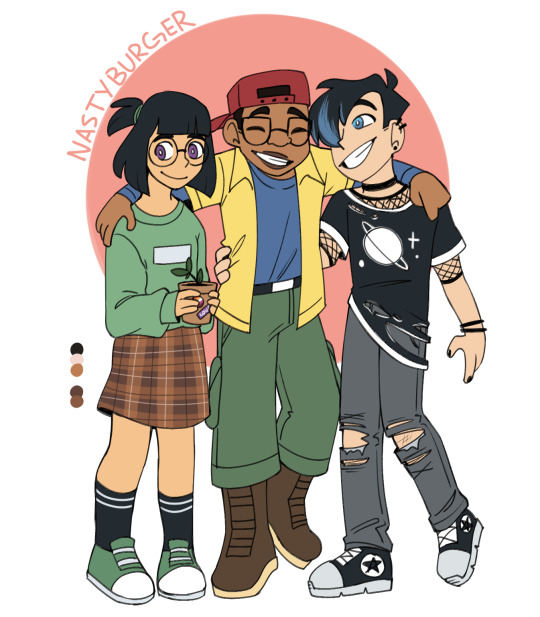
the tucker ghouly gang!
i promise you this is the least sad out of all the stories i know you guys dont trust me after mourner bUT TRUST ME
anyway, tucker’s ghost story! danny’s parents built the portal and it doesnt work as always. sometime in the morning the next day, danny goes into the portal by himself (no sam or tucker present), accidentally hits the switch, and.........nothing happens! being unable to find or fix the problems of the portal, danny just leaves and goes on about his day until his friends come over.
sam and tucker arrive later for a sleepover, they eat, play games, normal teenager stuff well into the night. the trio tries to sleep, but danny is kept up. he really wanted to figure out what was wrong with the portal and get it to work. his parents have been working on this project practically his entire life, and now the thing wont even turn on?! not to mention he was just plain curious about what was on the other side. the others notice their friend’s plight and so danny relays what happened earlier that day and his grievances about it. after mentioning how danny hit an on/off switch only for nothing to happen, tucker suggests that the button might’ve been wired wrong.
tucker, knowing his way around wiring electronics, offers to check out the portal. danny allows this and the trio all sneak down into the basement, still in their pjs. tucker picks up a few tools from the fenton lab, works on rewiring, danny and sam watching from outside. eventually, tucker is successful in the fix. but the gang forgot to unplug the portal/turn off the electricity so when tucker puts everything in place it turns on and you know the rest.
(not terribly important, but danny’s pjs is a simple black t-shirt with starry print pajama pants and sam’s would be a green pajama set ((the kind with a button up shirt and the same pattern over the whole thing)) with a white grid pattern. tucker’s pajama’s was a superhero onesie type thing, the circuit patterns on it being reflective material. as his ghost outfit, the circuit patterns now light up/appear when he uses his electricity powers. they are otherwise hidden.)
the fentons, sleeping upstairs in their room, rush down to the lab hearing all the commotion. by this time, tucker was already out, transformed back, and had an activated portal. their cover up story was that tucker only rewired something on the outside of the portal and in no way walked into the the thing. either way, needless to say jack and maddie grounded the trio (technically only danny was grounded, but the other parents were still definitely called and THEN they were grounded) it was the middle of the night though so they were at least allowed to finish their sleepover. the trio goes back up to danny’s room and basically just take their time working out that new ghost shit.
fast forwarding with ghouly’s origin story out of the way! this tucker is not really specifically based on any spiderverse character (even if some aspects of noir and ham are pulled for the “ghouly persona”) so none of those factors affect his story. if anything, how stuff plays out in his universe is probably closest to canon out of everyone else (just most of the trio roles being swapped) so theres not as much to explain.
though, i will say a lot of tucker’s lesson as a half ghost revolve a lot more around self awareness and becoming more humble, pulling back that self-centered attitude back a bit. its good to have confidence but dont let it go to your head type lessons! the way he learns to control his electricity powers play into this. while everyone else has to learn how to pull power from their core (like how canon danny needed to learn how to release his energy, even when it was building up so much to the point of becoming unbearable), tucker’s powers flowed more freely and never really needed to be taught how to unlock/tap into this ability. the lesson he needed to learn for his powers was how to reign in and control it.
as pointed out multiple times in previous asks, tucker and danny are dating in this universe! they probably got together the fastest out of everyone else with their respective romantic interest, so about half of ghouly’s “episodes/ghost career/whatever you want to call it” have them together. (tucker’s timeline isnt EXACTLY the same as in canon but for simplicity sake lets say it is) i would put their relationship being established sometime after ghouly’s version of doctor’s disorders and pirate radio or something like that. just as an estimate.
i didnt talk about sam too much in this universe even though i really wanted to and couldnt really fit it anywhere else so im tacking it on here at the end lmao. sam here is a plant nerd! where canon tucker frequently helps out with his hacking skills, this sam equips herself with a lot of natural remedies, powders, pastes, all sorts of stuff to impede ghosts. carries around her own concoction of blood blossom in a similar form of pepper spray as her main deal most likely. she also uses a lot of her plants to treat wounds as well! overall she’s just a cute little botanist nerd that could mix up some pretty dangerous poisons if she wanted to lol.
#please ignore that i forgot to draw dannys nail polish on his other hand haha#danny phantom#tucker foley#danny fenton#sam manson#dannyverse au#phantomverse#savant par#tucker ghouly#ghost post#ghost draws
2K notes
·
View notes